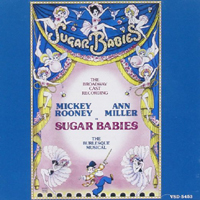 Original Broadway Cast, 1983 (B’way Entertainment/Varèse Sarabande)
Original Broadway Cast, 1983 (B’way Entertainment/Varèse Sarabande)  (2 / 5) Lavishly produced, beautifully designed, lovingly directed, Sugar Babies was a burlesque show featuring very funny old sketches performed by the unleashed Mickey Rooney, with Ann Miller as his partner and Jack Fletcher as his straight man. The production had a dog act, a candy butcher, a fan dancer — and you never knew what was going to come at you next. Unfortunately, this recording preserves very little of the show’s strongest suit: those hilarious low-comedy sketches, resurrected and dusted off by Ralph G. Allen. Instead, the album highlights the songs, and they’re a mostly lackluster bunch, even though nearly all of the music is by the great Jimmy McHugh. Some of the numbers have new lyrics by comedy writer Arthur Malvin; some are standards that McHugh wrote with Dorothy Fields, Ted Koehler, Harold Adamson, and others. They are well performed and orchestrated, but songs are not what we remember most about this show. — David Wolf
(2 / 5) Lavishly produced, beautifully designed, lovingly directed, Sugar Babies was a burlesque show featuring very funny old sketches performed by the unleashed Mickey Rooney, with Ann Miller as his partner and Jack Fletcher as his straight man. The production had a dog act, a candy butcher, a fan dancer — and you never knew what was going to come at you next. Unfortunately, this recording preserves very little of the show’s strongest suit: those hilarious low-comedy sketches, resurrected and dusted off by Ralph G. Allen. Instead, the album highlights the songs, and they’re a mostly lackluster bunch, even though nearly all of the music is by the great Jimmy McHugh. Some of the numbers have new lyrics by comedy writer Arthur Malvin; some are standards that McHugh wrote with Dorothy Fields, Ted Koehler, Harold Adamson, and others. They are well performed and orchestrated, but songs are not what we remember most about this show. — David Wolf
All posts by Michael Portantiere
Sugar
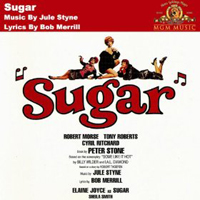 Original Broadway Cast, 1972 (United Artists/MGM)
Original Broadway Cast, 1972 (United Artists/MGM)  (2 / 5) Sugar was a shocker, the first indication that the great David Merrick production machine of the 1950s-’60s was breaking down. Gower Champion, one of the most dazzling director-choreographers of the period, reconstructed the show on the road pre-Broadway, replacing Johnny Desmond in the role of a singing gangster with hoofer Steve Condos, who was much more menacing because he said little and sang nothing but threateningly tap-danced everything. Merrick threw out the entire set and paid for a new one, but that wasn’t enough to make the show into a hit. Even the great, prolific composer Jule Styne was helpless when given lyrics as disgraceful as those provided him for this project by Bob Merrill. Perhaps the musical’s source material, the classic film comedy Some Like It Hot, simply resisted adaptation. Elaine Joyce had the impossible task of following Marilyn Monroe in what was easily her most appealing performance; Joyce comes across as cold and hard on the recording, though she wasn’t given any musical material that might have helped. Cyril Ritchard does nicely with his two numbers, which are among the better items in the score, but Tony Roberts (in the Tony Curtis part) has the dullest of the songs. This show was in Robert Morse’s pocket: As Daphne (the Jack Lemmon role), he kept Sugar running for over a year, giving an old-fashioned clown performance and making the most of every opportunity he was handed. Elliott Lawrence’s musical direction and Philip J. Lang’s orchestrations are so strong and confident that, as you listen, you may think the score is better than it is. [Ed. Note: Many years after its initial release, this album was reissued in a remastered CD version by Kritzerland, but it was a limited edition item and is no longer available.] — David Wolf
(2 / 5) Sugar was a shocker, the first indication that the great David Merrick production machine of the 1950s-’60s was breaking down. Gower Champion, one of the most dazzling director-choreographers of the period, reconstructed the show on the road pre-Broadway, replacing Johnny Desmond in the role of a singing gangster with hoofer Steve Condos, who was much more menacing because he said little and sang nothing but threateningly tap-danced everything. Merrick threw out the entire set and paid for a new one, but that wasn’t enough to make the show into a hit. Even the great, prolific composer Jule Styne was helpless when given lyrics as disgraceful as those provided him for this project by Bob Merrill. Perhaps the musical’s source material, the classic film comedy Some Like It Hot, simply resisted adaptation. Elaine Joyce had the impossible task of following Marilyn Monroe in what was easily her most appealing performance; Joyce comes across as cold and hard on the recording, though she wasn’t given any musical material that might have helped. Cyril Ritchard does nicely with his two numbers, which are among the better items in the score, but Tony Roberts (in the Tony Curtis part) has the dullest of the songs. This show was in Robert Morse’s pocket: As Daphne (the Jack Lemmon role), he kept Sugar running for over a year, giving an old-fashioned clown performance and making the most of every opportunity he was handed. Elliott Lawrence’s musical direction and Philip J. Lang’s orchestrations are so strong and confident that, as you listen, you may think the score is better than it is. [Ed. Note: Many years after its initial release, this album was reissued in a remastered CD version by Kritzerland, but it was a limited edition item and is no longer available.] — David Wolf
Subways Are for Sleeping
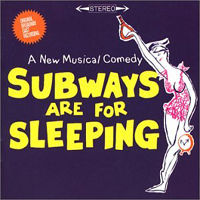 Original Broadway Cast, 1961 (Columbia/Fynsworth Alley)
Original Broadway Cast, 1961 (Columbia/Fynsworth Alley)  (4 / 5) A legendary title, if for no other reason than David Merrick’s scandalous marketing of the show: He looked in the phone book, found seven people with the same names as the major New York theater critics, and coaxed “rave reviews” from them, which he then had printed in a newspaper ad. This Jule Styne-Betty Comden-Adolph Green show was short-lived onstage, but it made for a cheerful, lively cast album that opens with a spectacular Styne overture, complete with subway effects and big, sassy orchestrations by Phil Lang. From there, it’s one urban delight after another. The score is heavy on comedy songs written with inimitable Comden-Green élan: Featured performer Phyllis Newman won a Tony Award largely on the basis of her hilarious “I Was a Shoo-ln.” Her vis-a-vis, Orson Bean, was nominated largely for his delivery of “I Just Can’t Wait (Till I See You With Clothes On).” You have to endure leading man Sydney Chaplin’s braying in “I’m Just Taking My Time,” but Chaplin nearly redeems himself in “Swing Your Projects,” a commentary on over-leveraged Gotham real estate that’s still topical. As Chaplin’s love interest, Carol Lawrence makes pretty noises in “Girls Like Me” and “I Said It and I’m Glad,” the latter a song with an arresting melody that was dropped during the run. Another appealing number is “Comes Once in a Lifetime.” The original LP album of Subways Are for Sleeping was packaged in a gatefold jacket, but reissues squeezed the notes onto one page. The CD edition offers intriguing bonuses: Comden and Green do a couple of cut songs; demo-album regulars Rose Marie Jun and Jack Haskell are heard from; and Comden’s pensive rendition of “Life’s Not That Simple,” a soulful casualty from Do Re Mi, is a joy. — Marc Miller
(4 / 5) A legendary title, if for no other reason than David Merrick’s scandalous marketing of the show: He looked in the phone book, found seven people with the same names as the major New York theater critics, and coaxed “rave reviews” from them, which he then had printed in a newspaper ad. This Jule Styne-Betty Comden-Adolph Green show was short-lived onstage, but it made for a cheerful, lively cast album that opens with a spectacular Styne overture, complete with subway effects and big, sassy orchestrations by Phil Lang. From there, it’s one urban delight after another. The score is heavy on comedy songs written with inimitable Comden-Green élan: Featured performer Phyllis Newman won a Tony Award largely on the basis of her hilarious “I Was a Shoo-ln.” Her vis-a-vis, Orson Bean, was nominated largely for his delivery of “I Just Can’t Wait (Till I See You With Clothes On).” You have to endure leading man Sydney Chaplin’s braying in “I’m Just Taking My Time,” but Chaplin nearly redeems himself in “Swing Your Projects,” a commentary on over-leveraged Gotham real estate that’s still topical. As Chaplin’s love interest, Carol Lawrence makes pretty noises in “Girls Like Me” and “I Said It and I’m Glad,” the latter a song with an arresting melody that was dropped during the run. Another appealing number is “Comes Once in a Lifetime.” The original LP album of Subways Are for Sleeping was packaged in a gatefold jacket, but reissues squeezed the notes onto one page. The CD edition offers intriguing bonuses: Comden and Green do a couple of cut songs; demo-album regulars Rose Marie Jun and Jack Haskell are heard from; and Comden’s pensive rendition of “Life’s Not That Simple,” a soulful casualty from Do Re Mi, is a joy. — Marc Miller
The Student Prince
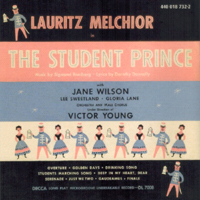 Studio Cast, 1950 (Decca)
Studio Cast, 1950 (Decca)  (3 / 5) Operetta albums from decades ago often sound even more dated than the material itself, with white-bread orchestrations and stilted singing. You’d expect the 1924 warhorse The Student Prince, with music by Sigmund Romberg and lyrics by Dorothy Donnelly, to come across badly in this recording; standards like “Serenade,” “Deep in My Heart, Dear,” and the “Drinking Song” can sound like parodies if mistreated. But the performance is quite good, thanks to Victor Young’s conducting and Lauritz Melchior’s singing. Although the heldentenor was thrice the age of an ideal Karl Franz at the time of the recording, he sounds like he could step right into a pair of lederhosen and play the hell out of the role. His top notes are thrilling, his enthusiasm infectious, and his thick accent great fun. (“The sweet May moon” comes out as “this wheat May moon”; “perfumed of roses and dew” sounds like “parv-youmed of roses and you.”) Jane Wilson’s American Kathie seems a little incongruous, but she’s warm and bright, despite some shrill trills. The original orchestrations are mostly intact, and Lee Sweetland and Gloria Lane offer able support. (Ed. Note: The CD edition of this recording also includes songs from The Merry Widow sung by Kitty Carlisle, Felix Knight, and Wilbur Evans. ) — Marc Miller
(3 / 5) Operetta albums from decades ago often sound even more dated than the material itself, with white-bread orchestrations and stilted singing. You’d expect the 1924 warhorse The Student Prince, with music by Sigmund Romberg and lyrics by Dorothy Donnelly, to come across badly in this recording; standards like “Serenade,” “Deep in My Heart, Dear,” and the “Drinking Song” can sound like parodies if mistreated. But the performance is quite good, thanks to Victor Young’s conducting and Lauritz Melchior’s singing. Although the heldentenor was thrice the age of an ideal Karl Franz at the time of the recording, he sounds like he could step right into a pair of lederhosen and play the hell out of the role. His top notes are thrilling, his enthusiasm infectious, and his thick accent great fun. (“The sweet May moon” comes out as “this wheat May moon”; “perfumed of roses and dew” sounds like “parv-youmed of roses and you.”) Jane Wilson’s American Kathie seems a little incongruous, but she’s warm and bright, despite some shrill trills. The original orchestrations are mostly intact, and Lee Sweetland and Gloria Lane offer able support. (Ed. Note: The CD edition of this recording also includes songs from The Merry Widow sung by Kitty Carlisle, Felix Knight, and Wilbur Evans. ) — Marc Miller
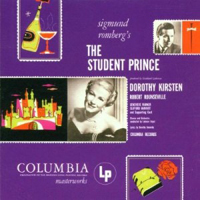 Studio Cast, 1952 (Columbia/DRG)
Studio Cast, 1952 (Columbia/DRG)  (3 / 5) Lehman Engel crams everything important from Sigmund Romberg’s landmark operetta into 52 minutes — quite a lengthy album for the time. The performance has a theatrical flair to it, right from the character-actor footmen in the opening number singing “By our bearing so sedate / We uphold the royal state.” The recording is well cast, with Robert Rounseville an enthusiastic Karl Franz (if a bit desperate on the top notes of “Serenade”)and Dorothy Kirsten a spirited Kathie. The choral singing is mushy at times, and some of the lyrics are unintelligible. An unbilled George Gaynes is easily recognizable in a prominent supporting role. — M.M.
(3 / 5) Lehman Engel crams everything important from Sigmund Romberg’s landmark operetta into 52 minutes — quite a lengthy album for the time. The performance has a theatrical flair to it, right from the character-actor footmen in the opening number singing “By our bearing so sedate / We uphold the royal state.” The recording is well cast, with Robert Rounseville an enthusiastic Karl Franz (if a bit desperate on the top notes of “Serenade”)and Dorothy Kirsten a spirited Kathie. The choral singing is mushy at times, and some of the lyrics are unintelligible. An unbilled George Gaynes is easily recognizable in a prominent supporting role. — M.M.
 Studio Cast, 1952 (RCA)
Studio Cast, 1952 (RCA)  (2 / 5) Oddly, when MGM made its 1954 film version of The Student Prince with Edmund Purdom lip-synching Mario Lanza’s vocals as he romanced Ann Blyth, no actual soundtrack album was released; instead, RCA offered this recording, which paired Lanza with Elizabeth Doubleday. The album includes three new songs by Nicholas Brodsky and Paul Francis Webster that were written for the movie. Lanza is in excellent voice here, but the sound quality of the mono recording is quite poor. This CD compilation also features Lanza et al. in excerpts from The Desert Song. — M.M.
(2 / 5) Oddly, when MGM made its 1954 film version of The Student Prince with Edmund Purdom lip-synching Mario Lanza’s vocals as he romanced Ann Blyth, no actual soundtrack album was released; instead, RCA offered this recording, which paired Lanza with Elizabeth Doubleday. The album includes three new songs by Nicholas Brodsky and Paul Francis Webster that were written for the movie. Lanza is in excellent voice here, but the sound quality of the mono recording is quite poor. This CD compilation also features Lanza et al. in excerpts from The Desert Song. — M.M.
 Studio Cast, 1960 (RCA/Sepia)
Studio Cast, 1960 (RCA/Sepia)  (3 / 5) A sort of stereo remake of the recording reviewed immediately above, this one has Mario Lanza joined by the coquettish Norma Giusti. The uncredited orchestrations are lush, and Paul Baron conducts with spirit. Lanza easily hits Karl Franz’s high notes, even with the keys pushed way up to show off his tenor. His singing is nicely understated in the Brodsky-Webster “Summertime in Heidelberg” and fervent in ”I’ll Walk With God.” Most of the original score’s songs are here, too, though wildly out of order and exclusively the property of Lanza and Giusti. Considering the absence of a supporting cast, this barely qualifies as a cast album, but the stereo sound quality is far superior to that of Lanza’s previous recording. — M.M.
(3 / 5) A sort of stereo remake of the recording reviewed immediately above, this one has Mario Lanza joined by the coquettish Norma Giusti. The uncredited orchestrations are lush, and Paul Baron conducts with spirit. Lanza easily hits Karl Franz’s high notes, even with the keys pushed way up to show off his tenor. His singing is nicely understated in the Brodsky-Webster “Summertime in Heidelberg” and fervent in ”I’ll Walk With God.” Most of the original score’s songs are here, too, though wildly out of order and exclusively the property of Lanza and Giusti. Considering the absence of a supporting cast, this barely qualifies as a cast album, but the stereo sound quality is far superior to that of Lanza’s previous recording. — M.M.
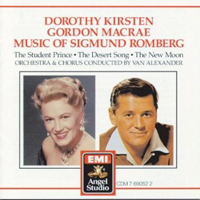 Studio Cast, 1962, Music of Sigmund Romberg (Capitol/Angel)
Studio Cast, 1962, Music of Sigmund Romberg (Capitol/Angel)  (2 / 5) Gordon MacRae’s unforced high baritone is always impressive, but he sounds bored and not very princely here. This recording also suffers from impersonal arrangements and bloodless conducting by Van Alexander. Dorothy Kirsten returns as Kathie, sounding much as she did 10 years earlier. Fully cast with no-name supporting players and capably backed by the Roger Wagner Chorale, the album zips through the score in 35 minutes but omits nothing major, reminding us how well Romberg spun standard-size scores into full-length operettas. With its safe tempi and American accents, this is sort of a summer-tent-theater rendering with a larger orchestra — agreeable enough, but more Harrisburg than Heidelberg. On Angel’s CD compilation, titled Music of Sigumund Romberg, the Student Prince tracks are accompanied by excerpts from The Desert Song and The New Moon. — M.M.
(2 / 5) Gordon MacRae’s unforced high baritone is always impressive, but he sounds bored and not very princely here. This recording also suffers from impersonal arrangements and bloodless conducting by Van Alexander. Dorothy Kirsten returns as Kathie, sounding much as she did 10 years earlier. Fully cast with no-name supporting players and capably backed by the Roger Wagner Chorale, the album zips through the score in 35 minutes but omits nothing major, reminding us how well Romberg spun standard-size scores into full-length operettas. With its safe tempi and American accents, this is sort of a summer-tent-theater rendering with a larger orchestra — agreeable enough, but more Harrisburg than Heidelberg. On Angel’s CD compilation, titled Music of Sigumund Romberg, the Student Prince tracks are accompanied by excerpts from The Desert Song and The New Moon. — M.M.
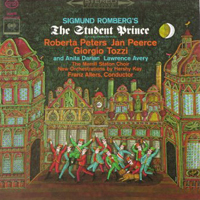 Studio Cast, 1962 (Columbia/no CD)
Studio Cast, 1962 (Columbia/no CD)  (1 / 5) Roberta Peters was a great lady of opera whose warmth and lack of pretension should have made her an ideal performer of operettas and musicals. Her entrance here, trilling in the “Drinking Song,” is lovely, and her voice is in wonderful shape; but afterward, there’s an excess of coyness that’s accentuated by the snatches of dialogue included on the recording. Jan Peerce as Karl Franz is a mature prince, but he has conviction, and Giorgi Tozzi is excellent as Dr. Engel. There’s just enough linking dialogue to propel the simple story. With a new set of orchestrations by the great Hershy Kay and musical direction by Franz Allers, this recording certainly seemed to have the potential to revitalize operetta, but Allers’ conducting is a trifle stiff, and Kay’s string-heavy charts don’t entirely escape that Muzak-operetta sound of the ’60s. — M.M.
(1 / 5) Roberta Peters was a great lady of opera whose warmth and lack of pretension should have made her an ideal performer of operettas and musicals. Her entrance here, trilling in the “Drinking Song,” is lovely, and her voice is in wonderful shape; but afterward, there’s an excess of coyness that’s accentuated by the snatches of dialogue included on the recording. Jan Peerce as Karl Franz is a mature prince, but he has conviction, and Giorgi Tozzi is excellent as Dr. Engel. There’s just enough linking dialogue to propel the simple story. With a new set of orchestrations by the great Hershy Kay and musical direction by Franz Allers, this recording certainly seemed to have the potential to revitalize operetta, but Allers’ conducting is a trifle stiff, and Kay’s string-heavy charts don’t entirely escape that Muzak-operetta sound of the ’60s. — M.M.
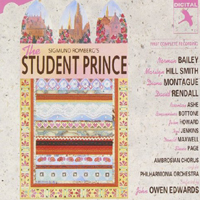 Studio Cast, 1990 (JAY, 2CDs)
Studio Cast, 1990 (JAY, 2CDs)  (4 / 5) Emil Gerstenberger was one of the outstanding Broadway orchestrators of the 1920s, equally adept at Romberg operetta and the jazzy musical comedies of the day. In the Romberg repertoire, his charts are lush and without that filmy coat of Muzak heard in many latter-day operetta recordings. For this first-ever complete recording of The Student Prince, the Philharmonia Orchestra and conductor John Owen Edwards recreated Gerstenberger’s work as closely as they could — and the result is a revelation. From the seven-minute overture to the bittersweet finale, the strings are full but not oppressive, the harp prominent but not obnoxious, and the brass thrillingly alive. It’s also a treat to hear a lot of incidental music not available elsewhere: an attractive waltz intermezzo, a couple of choral numbers, and some near-recitative linking passages. Edwards might have brought a little more urgency to the tempi, especially in the ballads, but his musical direction is otherwise expressive. As for the lead singers, Marilyn Hill Smith and Norman Bailey: If her Kathie seems to have arrived in Old Heidelberg by way of Mayfair, and if there’s a bit too much Dudley Do-Right in his attack, none of this compromises the material. David Rendall and Rosemary Ashe offer expert support, and a young Maria Friedman turns up as a “serving wench.” A single-disc highlights version is also available, but the double-CD set offers an authentic, 100-minute operetta experience. — M.M.
(4 / 5) Emil Gerstenberger was one of the outstanding Broadway orchestrators of the 1920s, equally adept at Romberg operetta and the jazzy musical comedies of the day. In the Romberg repertoire, his charts are lush and without that filmy coat of Muzak heard in many latter-day operetta recordings. For this first-ever complete recording of The Student Prince, the Philharmonia Orchestra and conductor John Owen Edwards recreated Gerstenberger’s work as closely as they could — and the result is a revelation. From the seven-minute overture to the bittersweet finale, the strings are full but not oppressive, the harp prominent but not obnoxious, and the brass thrillingly alive. It’s also a treat to hear a lot of incidental music not available elsewhere: an attractive waltz intermezzo, a couple of choral numbers, and some near-recitative linking passages. Edwards might have brought a little more urgency to the tempi, especially in the ballads, but his musical direction is otherwise expressive. As for the lead singers, Marilyn Hill Smith and Norman Bailey: If her Kathie seems to have arrived in Old Heidelberg by way of Mayfair, and if there’s a bit too much Dudley Do-Right in his attack, none of this compromises the material. David Rendall and Rosemary Ashe offer expert support, and a young Maria Friedman turns up as a “serving wench.” A single-disc highlights version is also available, but the double-CD set offers an authentic, 100-minute operetta experience. — M.M.
Strike Up the Band
 Studio Cast, 1991 (Elektra, 2CDs)
Studio Cast, 1991 (Elektra, 2CDs)  (5 / 5) The “Roxbury Recordings” series of restored Gershwin scores was a mixed bag, but this double CD of Strike Up the Band, recorded here in its unsuccessful 1927 version, is a joy. This was George and Ira Gershwin’s first attempt to actually say something in a musical. They created a plot-heavy but delightful score in perfect synch with the cynical book by George S. Kaufman and Morrie Ryskind. This painstaking reconstruction, with John Mauceri conducting orchestrations by eight different people (!), conveys the excitement of using musical comedy to score political points — a novelty in 1927. The recording is beautifully cast, with Brent Barrett and Rebecca Luker simultaneously sardonic and sincere in “The Man I love” and “Hoping That Someday You’d Care.” Jason Graae and Juliet Lambert are youthful ardor personified in “17 and 21” and “Military Dancing Drill,” while Beth Fowler is delicious in a Margaret Dumont-like role. Don Chastain plays a warmongering industrialist. There are two special bonuses here: a great, rediscovered Gershwin number, “Homeward Bound,” and Burton Lane’s gorgeous music for the verse for “Meadow Serenade” (the Gershwin melody couldn’t be tracked down). An appendix to the album adds six numbers from the rewritten (by Ryskind alone) 1930 version of the show, including the Gershwin perennials “Soon” and “I’ve Got a Crush on You.” The 1927 version may have shuttered in Philadelphia, but it’s a fascinating, acid satire on phony patriotism, unnecessary wars, and the corrupt military-industrial complex. Thank heaven we’ve outgrown such things! — Marc Miller
(5 / 5) The “Roxbury Recordings” series of restored Gershwin scores was a mixed bag, but this double CD of Strike Up the Band, recorded here in its unsuccessful 1927 version, is a joy. This was George and Ira Gershwin’s first attempt to actually say something in a musical. They created a plot-heavy but delightful score in perfect synch with the cynical book by George S. Kaufman and Morrie Ryskind. This painstaking reconstruction, with John Mauceri conducting orchestrations by eight different people (!), conveys the excitement of using musical comedy to score political points — a novelty in 1927. The recording is beautifully cast, with Brent Barrett and Rebecca Luker simultaneously sardonic and sincere in “The Man I love” and “Hoping That Someday You’d Care.” Jason Graae and Juliet Lambert are youthful ardor personified in “17 and 21” and “Military Dancing Drill,” while Beth Fowler is delicious in a Margaret Dumont-like role. Don Chastain plays a warmongering industrialist. There are two special bonuses here: a great, rediscovered Gershwin number, “Homeward Bound,” and Burton Lane’s gorgeous music for the verse for “Meadow Serenade” (the Gershwin melody couldn’t be tracked down). An appendix to the album adds six numbers from the rewritten (by Ryskind alone) 1930 version of the show, including the Gershwin perennials “Soon” and “I’ve Got a Crush on You.” The 1927 version may have shuttered in Philadelphia, but it’s a fascinating, acid satire on phony patriotism, unnecessary wars, and the corrupt military-industrial complex. Thank heaven we’ve outgrown such things! — Marc Miller
The Streets of New York
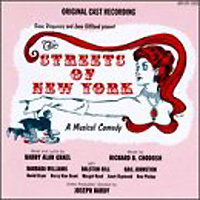 Original Off-Broadway Cast, 1964 (AEI)
Original Off-Broadway Cast, 1964 (AEI)  (5 / 5) For a long time, this was an extremely rare recording, so AEI’s CD release was especially welcome. With music by Richard Chodosh and lyrics by Barry Alan Grael, The Streets of New York is based on the famous old play of the same title by Dion Boucicault. Its melodramatic story should keep us at arm’s length from the characters, yet the songs are so compelling that the listener even comes to care about the so-called villains of the piece. The show begins with a through-sung prologue and then moves forward 20 years to 1890; each act concludes with an extended musical sequence utilizing reprises, leitmotifs, and some new melodies. The other 11 numbers represent some of the best musical theater writing of its day. Barbara Williams is deliciously evil if a tad shrill as Alida Bloodgood, giving outstanding performances of “He’ll Come to Me Crawling” and “Laugh After Laugh.” Hero and heroine David Cryer and Gail Johnston sing very well throughout, and particularly in the duet “Love Wins Again.” Ralston Hill is almost Shakespearean as principal villain Gideon Bloodgood, while co-author Grael is funny as the undependable yet finally heroic Badger, leading three Mexicans in the comedic “California.” A wonderful “Tourist Madrigal” reminds us that, in some respects, New York has changed very little over more than a century. Another highlight is the inventive “Where Can the Rich and Poor Be Friends?” It’s all quite delectable. — Jeffrey Dunn
(5 / 5) For a long time, this was an extremely rare recording, so AEI’s CD release was especially welcome. With music by Richard Chodosh and lyrics by Barry Alan Grael, The Streets of New York is based on the famous old play of the same title by Dion Boucicault. Its melodramatic story should keep us at arm’s length from the characters, yet the songs are so compelling that the listener even comes to care about the so-called villains of the piece. The show begins with a through-sung prologue and then moves forward 20 years to 1890; each act concludes with an extended musical sequence utilizing reprises, leitmotifs, and some new melodies. The other 11 numbers represent some of the best musical theater writing of its day. Barbara Williams is deliciously evil if a tad shrill as Alida Bloodgood, giving outstanding performances of “He’ll Come to Me Crawling” and “Laugh After Laugh.” Hero and heroine David Cryer and Gail Johnston sing very well throughout, and particularly in the duet “Love Wins Again.” Ralston Hill is almost Shakespearean as principal villain Gideon Bloodgood, while co-author Grael is funny as the undependable yet finally heroic Badger, leading three Mexicans in the comedic “California.” A wonderful “Tourist Madrigal” reminds us that, in some respects, New York has changed very little over more than a century. Another highlight is the inventive “Where Can the Rich and Poor Be Friends?” It’s all quite delectable. — Jeffrey Dunn
Street Scene
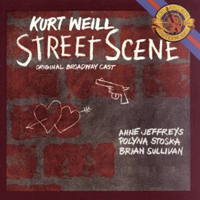 Original Broadway Cast, 1947 (Columbia/Sony)
Original Broadway Cast, 1947 (Columbia/Sony)  (4 / 5) Composer Kurt Weill and lyricist Langston Hughes set Elmer Rice’s 1929 Pulitzer Prize-winning play Street Scene to music as an opera, although there’s plenty of dialogue in it. The music underscores the talk very much as if Weill had scored a film instead of a play. A paean to the aspirations and frustrations of the common man, the piece is set on the sidewalk and street in front of a row of squalid tenements. For a work about the American melting pot, into which Weill himself had melted, he wrote great songs that sound unlike anything he’d written before, and Hughes’ lyrics are a complementary aspect of the drama. The central figures are Anna Maurrant; her jealous husband, Frank; their daughter, Rose; and Rose’s ardent suitor, Sam Kaplan. The action takes place on a day when Frank’s volatile behavior dims the future of the other three. This recording, well worth repeated listening, was produced by Goddard Lieberson, who perfected the concept of the original cast album. But note that Anne Jeffreys as Rose, Brian Sullivan as Sam, Polyna Stoska as Anna, and the rest of the cast are only heard in excerpts from the score, with some sections edited and others eliminated entirely from the recording. Jeffreys’ “What Good Would the Moon Be?” is vocally stunning, although her acting is routine. Sullivan sounds too mature for the young man he plays, but his “Lonely House” is lovely. Stoska’s strong voice impresses, and the children in the second-act opener “One, Two, Three, Four, Superman” are terrific. — David Finkle
(4 / 5) Composer Kurt Weill and lyricist Langston Hughes set Elmer Rice’s 1929 Pulitzer Prize-winning play Street Scene to music as an opera, although there’s plenty of dialogue in it. The music underscores the talk very much as if Weill had scored a film instead of a play. A paean to the aspirations and frustrations of the common man, the piece is set on the sidewalk and street in front of a row of squalid tenements. For a work about the American melting pot, into which Weill himself had melted, he wrote great songs that sound unlike anything he’d written before, and Hughes’ lyrics are a complementary aspect of the drama. The central figures are Anna Maurrant; her jealous husband, Frank; their daughter, Rose; and Rose’s ardent suitor, Sam Kaplan. The action takes place on a day when Frank’s volatile behavior dims the future of the other three. This recording, well worth repeated listening, was produced by Goddard Lieberson, who perfected the concept of the original cast album. But note that Anne Jeffreys as Rose, Brian Sullivan as Sam, Polyna Stoska as Anna, and the rest of the cast are only heard in excerpts from the score, with some sections edited and others eliminated entirely from the recording. Jeffreys’ “What Good Would the Moon Be?” is vocally stunning, although her acting is routine. Sullivan sounds too mature for the young man he plays, but his “Lonely House” is lovely. Stoska’s strong voice impresses, and the children in the second-act opener “One, Two, Three, Four, Superman” are terrific. — David Finkle
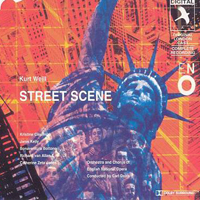 Original London Cast, 1989 (JAY, 2CDs)
Original London Cast, 1989 (JAY, 2CDs)  (4 / 5) It took more than 40 years for Street Scene to be introduced to British audiences, courtesy of the English National Opera. Conductor Carl Davis put together a cast that’s stronger on singing than emoting, as most opera-house casts are. It doesn’t help that this show calls for all sorts of accents from the characters, because it’s set in a New York City tenement that houses people of various ethnicities. But if some of the singers in supporting roles struggle with Langston Hughes’ lyrics, the leads are intelligible and sing like angels. Kurt Weill worked in a number of musical modes when composing this score; for example, “Moon-faced, Starry-Eyed” is his quite good notion of a jitterbug, performed here by Philip Day and Catherine Zeta-Jones. The other principals include Kristine Ciesinski, Janis Kelly, Bonaventura Bottone, and Richard van Allen as the four characters caught up in the plot’s climactic turn of events. They variously get to sing some truly exquisite arias, such as the poignant “Lonely House” and the equally stunning “What Good Would the Moon Be?” Because sections of Street Scene are melodramatic and/or sentimental, the piece as a whole may now seem dated — but the music isn’t. And when two nursemaids sing a lullaby to their charges about the horrible newspaper headlines, we hear Weill and Hughes at their most scathing. — D.F.
(4 / 5) It took more than 40 years for Street Scene to be introduced to British audiences, courtesy of the English National Opera. Conductor Carl Davis put together a cast that’s stronger on singing than emoting, as most opera-house casts are. It doesn’t help that this show calls for all sorts of accents from the characters, because it’s set in a New York City tenement that houses people of various ethnicities. But if some of the singers in supporting roles struggle with Langston Hughes’ lyrics, the leads are intelligible and sing like angels. Kurt Weill worked in a number of musical modes when composing this score; for example, “Moon-faced, Starry-Eyed” is his quite good notion of a jitterbug, performed here by Philip Day and Catherine Zeta-Jones. The other principals include Kristine Ciesinski, Janis Kelly, Bonaventura Bottone, and Richard van Allen as the four characters caught up in the plot’s climactic turn of events. They variously get to sing some truly exquisite arias, such as the poignant “Lonely House” and the equally stunning “What Good Would the Moon Be?” Because sections of Street Scene are melodramatic and/or sentimental, the piece as a whole may now seem dated — but the music isn’t. And when two nursemaids sing a lullaby to their charges about the horrible newspaper headlines, we hear Weill and Hughes at their most scathing. — D.F.
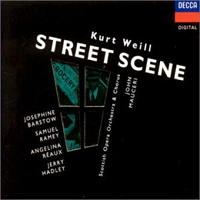 Studio Cast, 1990 (London, 2CDs)
Studio Cast, 1990 (London, 2CDs)  (4 / 5) Street Scene is a nearly through-sung piece, and conductor John Mauceri’s tangy, respectful treatment is only the second complete recording to appear, hot on the heels of the 1989 effort reviewed above. The score is sung beautifully and with appropriate passion by a cast led by Josephine Barstow, Samuel Ramey, Angelina Reaux, and Jerry Hadley. But the acting, which includes a turn by maestro Mauceri as a police officer, isn’t quite so beautiful or passionate; Ramey does some particularly leaden emoting as the bullying husband in a melodrama that telescopes birth, death, and thwarted romance into a couple of hot June days. Perhaps because Mauceri is such a purist, he takes no liberties with tempi or meter. As a result, the awkward manner in which some of the words are set to the melodies is more noticeable here, and this must have presented a challenge for the singers. On the other hand, in declaiming their lines with such fervor, these performers see to it that the authors’ political and social criticism comes across loud and clear, helped by the fact that the recording is very well engineered. — D.F.
(4 / 5) Street Scene is a nearly through-sung piece, and conductor John Mauceri’s tangy, respectful treatment is only the second complete recording to appear, hot on the heels of the 1989 effort reviewed above. The score is sung beautifully and with appropriate passion by a cast led by Josephine Barstow, Samuel Ramey, Angelina Reaux, and Jerry Hadley. But the acting, which includes a turn by maestro Mauceri as a police officer, isn’t quite so beautiful or passionate; Ramey does some particularly leaden emoting as the bullying husband in a melodrama that telescopes birth, death, and thwarted romance into a couple of hot June days. Perhaps because Mauceri is such a purist, he takes no liberties with tempi or meter. As a result, the awkward manner in which some of the words are set to the melodies is more noticeable here, and this must have presented a challenge for the singers. On the other hand, in declaiming their lines with such fervor, these performers see to it that the authors’ political and social criticism comes across loud and clear, helped by the fact that the recording is very well engineered. — D.F.
Stop the World — I Want to Get Off
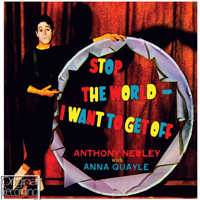 Original London Cast, 1961 (Decca/Hallmark)
Original London Cast, 1961 (Decca/Hallmark)  (4 / 5) This may not be a great musical, but it has a great score by Leslie Bricusse and Anthony Newley. These are inventive, compelling songs. The lyrics are impeccable, full of fresh ideas and good jokes, sitting perfectly on the music and rhyming skillfully; the melodic music is whimsical on occasion, but emotionally rich when it needs to be. A rather pretentious, abstract piece set in a circus ring, Stop the World — I Want to Get Off tells the story of Littlechap (played by Newley) from birth to death, using musical theater, British music hall, and mime techniques. The songs chart this Everyman’s rise from poverty to success in business and a run for public office. Littlechap marries the boss’s daughter (Anna Quayle) after getting her pregnant. Though he is often unfaithful to her, all of the women with whom he dallies are essentially his wife; Quayle plays all of them with great comedic skill. In addition to funny material for Littlechap’s romantic conquests, there are some nice musical scenes (“Nag! Nag! Nag!” and “Mumbo Jumbo”) and three instant hit songs: “Gonna Build a Mountain,” “Once in a Lifetime,” and “What Kind of Fool Am I?”– David Wolf
(4 / 5) This may not be a great musical, but it has a great score by Leslie Bricusse and Anthony Newley. These are inventive, compelling songs. The lyrics are impeccable, full of fresh ideas and good jokes, sitting perfectly on the music and rhyming skillfully; the melodic music is whimsical on occasion, but emotionally rich when it needs to be. A rather pretentious, abstract piece set in a circus ring, Stop the World — I Want to Get Off tells the story of Littlechap (played by Newley) from birth to death, using musical theater, British music hall, and mime techniques. The songs chart this Everyman’s rise from poverty to success in business and a run for public office. Littlechap marries the boss’s daughter (Anna Quayle) after getting her pregnant. Though he is often unfaithful to her, all of the women with whom he dallies are essentially his wife; Quayle plays all of them with great comedic skill. In addition to funny material for Littlechap’s romantic conquests, there are some nice musical scenes (“Nag! Nag! Nag!” and “Mumbo Jumbo”) and three instant hit songs: “Gonna Build a Mountain,” “Once in a Lifetime,” and “What Kind of Fool Am I?”– David Wolf
 Original Broadway Cast, 1962 (London/Decca)
Original Broadway Cast, 1962 (London/Decca)  (5 / 5) I would rate this the best recording of the wonderful Stop the World score if only for the drummer in the overture, but there is much more here to recommend. It’s a hotter record than the British cast album, with a tighter, seemingly larger orchestra that can really swing. Star Anthony Newley is sharper than on the London album, singing and acting Littlechap’s songs with greater precision, insight, and flair. Anna Quayle is again wonderfully funny, and the unique score continues to be a marvel. — D.W.
(5 / 5) I would rate this the best recording of the wonderful Stop the World score if only for the drummer in the overture, but there is much more here to recommend. It’s a hotter record than the British cast album, with a tighter, seemingly larger orchestra that can really swing. Star Anthony Newley is sharper than on the London album, singing and acting Littlechap’s songs with greater precision, insight, and flair. Anna Quayle is again wonderfully funny, and the unique score continues to be a marvel. — D.W.
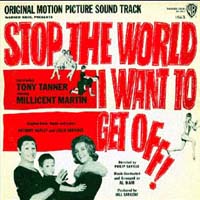 Film Soundtrack, 1966 (Warner Bros./no CD)
Film Soundtrack, 1966 (Warner Bros./no CD)  (1 / 5) The original Stop the World orchestrations have been softened here, some of the tempi are slower, and the performers can’t begin to compete with Anthony Newley and Anna Quayle. Tony Tanner, who replaced Newley onstage, comes through creditably but without his predecessor’s dramatic singing style. As all of the women in Littlechap’s life, Millicent Martin, a talented performer, simply doesn’t register, for some reason. The score is presented more or less as heard onstage in London and New York, except that the Typically German woman with whom Littlechap gets involved is a Typically Japanese one here, and a terrible song titled “I Believed It All” has been inserted for the chorus at the end. — D.W.
(1 / 5) The original Stop the World orchestrations have been softened here, some of the tempi are slower, and the performers can’t begin to compete with Anthony Newley and Anna Quayle. Tony Tanner, who replaced Newley onstage, comes through creditably but without his predecessor’s dramatic singing style. As all of the women in Littlechap’s life, Millicent Martin, a talented performer, simply doesn’t register, for some reason. The score is presented more or less as heard onstage in London and New York, except that the Typically German woman with whom Littlechap gets involved is a Typically Japanese one here, and a terrible song titled “I Believed It All” has been inserted for the chorus at the end. — D.W.
 Broadway Cast, 1978 (Warner Bros./no CD)
Broadway Cast, 1978 (Warner Bros./no CD)  (1 / 5) Since Sammy Davis, Jr. had made hit recordings of “Gonna Build a Mountain,” “What Kind of Fool Am I?” and “Once in a Lifetime,” it seemed reasonable to cast him as Littlechap in this revival, but he was not really suitable for the role. The character was Americanized and renamed “Littlecat,” and the material was cheapened in many ways, from the new orchestrations to the staging to the crudely rewritten lyrics. The new “Jewish” section of “Mumbo Jumbo” is embarrassing, and a completely new song called “Life Is a Woman” adds nothing to the proceedings. “Family Fugue”/ “Nag! Nag! Nag!” has been cut entirely. Davis, a great pop singer who had previously proven himself in musical theater, comes across here as if he’s giving a personal appearance rather than performing in a book show. The gifted comedian Marian Mercer is a little understated as Littlecat’s wife et al., although she does find a new, amusing take on the Russian woman. This production was eventually filmed as Sammy Stops the World, but the movie was never released. — D.W.
(1 / 5) Since Sammy Davis, Jr. had made hit recordings of “Gonna Build a Mountain,” “What Kind of Fool Am I?” and “Once in a Lifetime,” it seemed reasonable to cast him as Littlechap in this revival, but he was not really suitable for the role. The character was Americanized and renamed “Littlecat,” and the material was cheapened in many ways, from the new orchestrations to the staging to the crudely rewritten lyrics. The new “Jewish” section of “Mumbo Jumbo” is embarrassing, and a completely new song called “Life Is a Woman” adds nothing to the proceedings. “Family Fugue”/ “Nag! Nag! Nag!” has been cut entirely. Davis, a great pop singer who had previously proven himself in musical theater, comes across here as if he’s giving a personal appearance rather than performing in a book show. The gifted comedian Marian Mercer is a little understated as Littlecat’s wife et al., although she does find a new, amusing take on the Russian woman. This production was eventually filmed as Sammy Stops the World, but the movie was never released. — D.W.
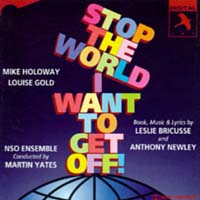 Studio Cast, 1996 (JAY-TER)
Studio Cast, 1996 (JAY-TER)  (3 / 5) There’s some material here than can’t be found on the wonderful original London and Broadway cast albums of Stop the World. “Welcome to Sludgepool” (introducing the Russian sequence), a reprise of “Once in a Lifetime” (leading into “Mumbo Jumbo”), the entr’acte, and play-out music are among the extras. Mike Holloway is a perfectly adequate Littlechap, but he lacks the star presence required for the role. As Mrs. Littlechap and all the women with whom her husband has affairs, Louise Gold is fine but not innately comedic. Still, it must be said that the extraordinary Newley-Bricusse score comes through with its ingenuity and wit intact. The orchestra is well conducted by Michael Yates. — D.W.
(3 / 5) There’s some material here than can’t be found on the wonderful original London and Broadway cast albums of Stop the World. “Welcome to Sludgepool” (introducing the Russian sequence), a reprise of “Once in a Lifetime” (leading into “Mumbo Jumbo”), the entr’acte, and play-out music are among the extras. Mike Holloway is a perfectly adequate Littlechap, but he lacks the star presence required for the role. As Mrs. Littlechap and all the women with whom her husband has affairs, Louise Gold is fine but not innately comedic. Still, it must be said that the extraordinary Newley-Bricusse score comes through with its ingenuity and wit intact. The orchestra is well conducted by Michael Yates. — D.W.
Steel Pier
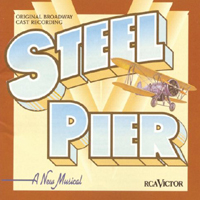 Original Broadway Cast, 1997 (RCA)
Original Broadway Cast, 1997 (RCA)  (2 / 5) The idea of a John Kander and Fred Ebb musical set during a 1930s dance marathon sounds like a natural; this milieu would seem to be an ideal backdrop for the team’s trademark blend of cynicism and tough romance. But David Thompson’s book is a drippy, New-Age tale about a stunt pilot (played by Daniel McDonald) who comes back from the dead to save a naive dance marathon contestant (Karen Ziemba) from the clutches of her husband (Gregory Harrison), a promoter who always makes sure that the fix is in. Ziemba’s opener, “Willing to Ride,” and the scene-setting production number “Everybody Dance” are typical Kander and Ebb, simultaneously hard-edged and ebullient. McDonald’s first big number, “Second Chance,” benefits from a bouncy Kander melody and a clever Ebb lyric. But the authors’ uncertain handling of Harrison’s character is seen in “A Powerful Thing,” which tries unsuccessfully to play the fellow’s nastier qualities for laughs. Debra Monk, as a love-’em-and-leave-’em type, wrestles with two substandard numbers: the crude “Everybody’s Girl” (“I could never be a cowhand’s girl; I just can’t keep my calves together!”) and the maudlin “Somebody Older.” Ziemba’s big second-act solo, “Running in Place,” falls flat. (Orchestrator Michael Gibson is on more solid ground during the lengthy dance sequences.) Ziemba herself is a treat, and diva-watchers will enjoy Kristin Chenoweth, in an early Broadway appearance, demonstrating her coloratura in the wedding number “Two Little Words.”Still, this is possibly Kander and Ebb’s weakest show. — David Barbour
(2 / 5) The idea of a John Kander and Fred Ebb musical set during a 1930s dance marathon sounds like a natural; this milieu would seem to be an ideal backdrop for the team’s trademark blend of cynicism and tough romance. But David Thompson’s book is a drippy, New-Age tale about a stunt pilot (played by Daniel McDonald) who comes back from the dead to save a naive dance marathon contestant (Karen Ziemba) from the clutches of her husband (Gregory Harrison), a promoter who always makes sure that the fix is in. Ziemba’s opener, “Willing to Ride,” and the scene-setting production number “Everybody Dance” are typical Kander and Ebb, simultaneously hard-edged and ebullient. McDonald’s first big number, “Second Chance,” benefits from a bouncy Kander melody and a clever Ebb lyric. But the authors’ uncertain handling of Harrison’s character is seen in “A Powerful Thing,” which tries unsuccessfully to play the fellow’s nastier qualities for laughs. Debra Monk, as a love-’em-and-leave-’em type, wrestles with two substandard numbers: the crude “Everybody’s Girl” (“I could never be a cowhand’s girl; I just can’t keep my calves together!”) and the maudlin “Somebody Older.” Ziemba’s big second-act solo, “Running in Place,” falls flat. (Orchestrator Michael Gibson is on more solid ground during the lengthy dance sequences.) Ziemba herself is a treat, and diva-watchers will enjoy Kristin Chenoweth, in an early Broadway appearance, demonstrating her coloratura in the wedding number “Two Little Words.”Still, this is possibly Kander and Ebb’s weakest show. — David Barbour
State Fair
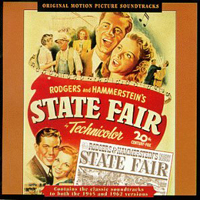 Selections From 1945 and 1962 Film Soundtracks (Varèse Sarabande)
Selections From 1945 and 1962 Film Soundtracks (Varèse Sarabande)  (2 / 5) The Rodgers and Hammerstein score for the 1945 film version of State Fair is unlike any of the team’s other efforts in that many of the songs are spotted as numbers performed at parties, nightclubs, etc., rather than helping to develop the characters. Still, it’s a fine score that includes “It Might as Well Be Spring,” “It’s a Grand Night for Singing,” the less famous but wonderful “Isn’t It Kinda Fun?” and the catchy title tune. This compilation contains all of the songs from both the 1945 film and the 1962 remake. The six songs and various reprises from the earlier movie are performed in slower tempi, and feature orchestrations by Alfred Newman. Dubbing for Jeanne Crain, Louanne Hogan sings “It Might as Well Be Spring” well, if impersonally — and Vivian Blaine and Dick Haymes sing almost everything else. The later movie cut one of the original songs and, with Hammerstein deceased, Rodgers wrote music and lyrics for five new ones, all of them weak. Farmer Tom Ewell has a creepy love song to a pig that includes the line “Warm and soft affection lies / In your teeny-weeny eyes.” Playing the mother, Alice Faye sings “Never Say No to a Man” as though apologizing for the lyrics. Pat Boone and Ann-Margret play one romantic couple, Bobby Darin and Pamela Tiffin (dubbed by Anita Gordon) are the other. They’re all okay. Musical outtakes from the first film and some instrumental music from the second one, arranged by Newman with Ken Darby, are also included. — David Wolf
(2 / 5) The Rodgers and Hammerstein score for the 1945 film version of State Fair is unlike any of the team’s other efforts in that many of the songs are spotted as numbers performed at parties, nightclubs, etc., rather than helping to develop the characters. Still, it’s a fine score that includes “It Might as Well Be Spring,” “It’s a Grand Night for Singing,” the less famous but wonderful “Isn’t It Kinda Fun?” and the catchy title tune. This compilation contains all of the songs from both the 1945 film and the 1962 remake. The six songs and various reprises from the earlier movie are performed in slower tempi, and feature orchestrations by Alfred Newman. Dubbing for Jeanne Crain, Louanne Hogan sings “It Might as Well Be Spring” well, if impersonally — and Vivian Blaine and Dick Haymes sing almost everything else. The later movie cut one of the original songs and, with Hammerstein deceased, Rodgers wrote music and lyrics for five new ones, all of them weak. Farmer Tom Ewell has a creepy love song to a pig that includes the line “Warm and soft affection lies / In your teeny-weeny eyes.” Playing the mother, Alice Faye sings “Never Say No to a Man” as though apologizing for the lyrics. Pat Boone and Ann-Margret play one romantic couple, Bobby Darin and Pamela Tiffin (dubbed by Anita Gordon) are the other. They’re all okay. Musical outtakes from the first film and some instrumental music from the second one, arranged by Newman with Ken Darby, are also included. — David Wolf
 Original Broadway Cast, 1996 (DRG)
Original Broadway Cast, 1996 (DRG)  (4 / 5) The Broadway version of State Fair yielded an entertaining cast album. It includes all of the standards from the 1945 film, plus nine other Rodgers and Hammerstein songs: “So Far,” from Allegro; “The Man I Used to Be” and “The Next Time It Happens,” from Pipe Dream; “That’s the Way It Happens” and the deleted “You Never Had It So Good,” from Me and ]uliet; and “Boys and Girls Like You and Me” and “When I Go Out Walking With My Baby,” both cut from Oklahoma! Rodgers’ lamentable ode to a pig, “More Than Just a Friend,” is less repellent as a barbershop quartet here than as the solo it was in the 1962 film. The recording features strong vocal performances by Donna McKechnie, Andrea McArdle, Scott Wise, John Davidson, Kathryn Crosby, and Ben Wright. Bruce Pomahac’s orchestrations are terrific, and so is Scot Wooley’s dance music. — D.W.
(4 / 5) The Broadway version of State Fair yielded an entertaining cast album. It includes all of the standards from the 1945 film, plus nine other Rodgers and Hammerstein songs: “So Far,” from Allegro; “The Man I Used to Be” and “The Next Time It Happens,” from Pipe Dream; “That’s the Way It Happens” and the deleted “You Never Had It So Good,” from Me and ]uliet; and “Boys and Girls Like You and Me” and “When I Go Out Walking With My Baby,” both cut from Oklahoma! Rodgers’ lamentable ode to a pig, “More Than Just a Friend,” is less repellent as a barbershop quartet here than as the solo it was in the 1962 film. The recording features strong vocal performances by Donna McKechnie, Andrea McArdle, Scott Wise, John Davidson, Kathryn Crosby, and Ben Wright. Bruce Pomahac’s orchestrations are terrific, and so is Scot Wooley’s dance music. — D.W.
Starting Here, Starting Now
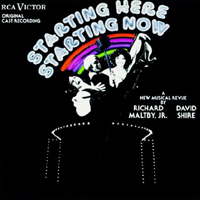 Original Off-Broadway Cast, 1977 (RCA)
Original Off-Broadway Cast, 1977 (RCA)  (5 / 5) Few cast recordings are as good as this one, made up of songs written by Richard Maltby, Jr. and David Shire for about 10 years’ worth of unsuccessful shows. These actable showpieces are the best ever written by the team, and this assemblage is just about the most satisfying songwriter anthology ever created. The songs are mostly sharp vignettes about New Yorkers, performed by George Lee Andrews, Loni Ackerman, and Margery Cohen, who sing wonderfully well and are utterly charming. Both women share the irresistible “I Think I May Want to Remember Today,” and Ackerman freaks out hilariously when doing the “Sunday Times Crossword Puzzle.” Cohen shines most brightly in “Song of Me,” “A Little Bit Off,” and “Autumn.” Andrews provides a strong, masculine ballast in the explosive “I Don’t Remember Christmas,” the funny “We Can Talk to Each Other,” and the touching “I Hear Bells.” Of all the 21 songs on this disc, only two are less than interesting: the title number and “What About Today?” With so much imitative musical theater writing out there, the best thing about these songs is that each of them is a fresh and original piece of work. — David Wolf
(5 / 5) Few cast recordings are as good as this one, made up of songs written by Richard Maltby, Jr. and David Shire for about 10 years’ worth of unsuccessful shows. These actable showpieces are the best ever written by the team, and this assemblage is just about the most satisfying songwriter anthology ever created. The songs are mostly sharp vignettes about New Yorkers, performed by George Lee Andrews, Loni Ackerman, and Margery Cohen, who sing wonderfully well and are utterly charming. Both women share the irresistible “I Think I May Want to Remember Today,” and Ackerman freaks out hilariously when doing the “Sunday Times Crossword Puzzle.” Cohen shines most brightly in “Song of Me,” “A Little Bit Off,” and “Autumn.” Andrews provides a strong, masculine ballast in the explosive “I Don’t Remember Christmas,” the funny “We Can Talk to Each Other,” and the touching “I Hear Bells.” Of all the 21 songs on this disc, only two are less than interesting: the title number and “What About Today?” With so much imitative musical theater writing out there, the best thing about these songs is that each of them is a fresh and original piece of work. — David Wolf
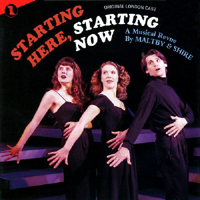 Original London Cast, 1997 (JAY-TER)
Original London Cast, 1997 (JAY-TER)  (3 / 5) If you like Maltby and Shire’s Starting Here, Starting Now as much as I do, you may want to own this recording as well as the original Off-Broadway album, because the London cast recording contains five additional songs (plus a little encore/reprise). But note that the British performers are not as fine as their American counterparts: Michael Cantwell is a little soft, Clare Burt is a little hard, and in general, the cast lacks the effortless charm of the New York company. — D.W.
(3 / 5) If you like Maltby and Shire’s Starting Here, Starting Now as much as I do, you may want to own this recording as well as the original Off-Broadway album, because the London cast recording contains five additional songs (plus a little encore/reprise). But note that the British performers are not as fine as their American counterparts: Michael Cantwell is a little soft, Clare Burt is a little hard, and in general, the cast lacks the effortless charm of the New York company. — D.W.
Stars in Your Eyes
 Ethel Merman With Studio Artists, 1939 (Liberty/AEI)
Ethel Merman With Studio Artists, 1939 (Liberty/AEI)  (3 / 5) The first musical with a score by composer Arthur Schwartz and lyricist Dorothy Fields, Stars in Your Eyes reunited Ethel Merman and Jimmy Durante, who had worked together in Cole Porter’s Red, Hot and Blue. While Stars ran for only a few months, Merman recorded four of her songs with the show’s musical director Al Goodman and his orchestra. “A Lady Needs a Change” is typically sassy, brassy Merman, but the other three numbers — “This Is It,” “I’ll Pay the Check,” and “Just a Little Bit More” — require her to dig a little deeper than usual, and she’s more than up to the challenge. Clear-voiced and impassioned, she makes these songs her own. Richard Smart, who was not in the show, sings “All the Time” and “Terribly Attractive,” and Al and Lee Reiser offer an instrumental medley. It’s nice to have seven numbers from this mostly forgotten musical preserved in this collection, paired with songs from Red, Hot and Blue. (Not included here is a radio broadcast recording of Merman and Durante doing their show-stopping “It’s All Yours,” but you can find it on Ben Bagley’s Arthur Schwartz Revisited album.) — Jeffrey Dunn
(3 / 5) The first musical with a score by composer Arthur Schwartz and lyricist Dorothy Fields, Stars in Your Eyes reunited Ethel Merman and Jimmy Durante, who had worked together in Cole Porter’s Red, Hot and Blue. While Stars ran for only a few months, Merman recorded four of her songs with the show’s musical director Al Goodman and his orchestra. “A Lady Needs a Change” is typically sassy, brassy Merman, but the other three numbers — “This Is It,” “I’ll Pay the Check,” and “Just a Little Bit More” — require her to dig a little deeper than usual, and she’s more than up to the challenge. Clear-voiced and impassioned, she makes these songs her own. Richard Smart, who was not in the show, sings “All the Time” and “Terribly Attractive,” and Al and Lee Reiser offer an instrumental medley. It’s nice to have seven numbers from this mostly forgotten musical preserved in this collection, paired with songs from Red, Hot and Blue. (Not included here is a radio broadcast recording of Merman and Durante doing their show-stopping “It’s All Yours,” but you can find it on Ben Bagley’s Arthur Schwartz Revisited album.) — Jeffrey Dunn
Starmites
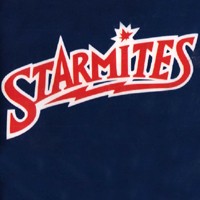 Studio Cast, 1998 (Original Cast Records)
Studio Cast, 1998 (Original Cast Records)  (1 / 5) Starmites earned six Tony Award nominations in 1989, at the end of one of the leanest Broadway musical seasons in history. All about a shy teenager named Eleanor who builds a fantasy world around the sci-fi characters in the comic books she collects, the show has mediocre but functional music and lyrics by Barry Keating, who collaborated on the book with Stuart Ross. Some of the melodies are catchy, such as the title song (which calls to mind “Little Shop of Horrors”), and others are pretty enough — for example, the “Love Duet” between Eleanor and Spacepunk, the Starmites’ “heartthrob captain.” As for the lyrics, some (“Call me macho, a hot-to-trot joe”) are more skillful than others (“Her etiquette’s so delicate”). This recording was made about nine years after the show’s Broadway run; missing are two of the original cast members, Brian Lane Green and Sharon McNight, who were the best things about the production. But Broadway cast member Liz Larsen is back as Eleanor — and, for better or worse, so is Gabriel Barre in the dual role of Trinkulus/Shak Graa. — Michael Portantiere
(1 / 5) Starmites earned six Tony Award nominations in 1989, at the end of one of the leanest Broadway musical seasons in history. All about a shy teenager named Eleanor who builds a fantasy world around the sci-fi characters in the comic books she collects, the show has mediocre but functional music and lyrics by Barry Keating, who collaborated on the book with Stuart Ross. Some of the melodies are catchy, such as the title song (which calls to mind “Little Shop of Horrors”), and others are pretty enough — for example, the “Love Duet” between Eleanor and Spacepunk, the Starmites’ “heartthrob captain.” As for the lyrics, some (“Call me macho, a hot-to-trot joe”) are more skillful than others (“Her etiquette’s so delicate”). This recording was made about nine years after the show’s Broadway run; missing are two of the original cast members, Brian Lane Green and Sharon McNight, who were the best things about the production. But Broadway cast member Liz Larsen is back as Eleanor — and, for better or worse, so is Gabriel Barre in the dual role of Trinkulus/Shak Graa. — Michael Portantiere
Starlight Express
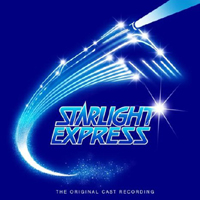 Original London Cast, 1984 (Really Useful Records, 2CDs)
Original London Cast, 1984 (Really Useful Records, 2CDs)  (3 / 5) Starlight Express is the most enjoyable show — or, to look at it from another perspective, the least objectionable — that Andrew Lloyd Webber wrote after his partnership with Tim Rice broke up. With lyrics by Richard Stilgoe that are mostly fun and suitable to the story, this fantasy about anthropomorphized toy trains is rather juvenile, but at least it’s not pretentious. And the pastiche score is largely delightful. Highlights include the opening “Rolling Stock” and “Pumping Iron,” two homoerotic numbers in which the diesel engine “Greaseball” sings lead. The songs written for the female trains Belle, Dinah, and Pearl aren’t as interesting, though Dinah’s “Uncoupled” is a cute spoof of a country-western lament. The show’s title song has a soaring melody that ranks among the very best Lloyd Webber ever wrote. Oddly, while the entire company is listed on the back cover of the CD booklet for the original release of this cast album, nowhere are we informed which roles they play or which songs they sing; and though all of the lyrics sung on the album are printed in the booklet, you’ll need a magnifying glass to read them. Better to purchase these tracks as downloads. — Michael Portantiere
(3 / 5) Starlight Express is the most enjoyable show — or, to look at it from another perspective, the least objectionable — that Andrew Lloyd Webber wrote after his partnership with Tim Rice broke up. With lyrics by Richard Stilgoe that are mostly fun and suitable to the story, this fantasy about anthropomorphized toy trains is rather juvenile, but at least it’s not pretentious. And the pastiche score is largely delightful. Highlights include the opening “Rolling Stock” and “Pumping Iron,” two homoerotic numbers in which the diesel engine “Greaseball” sings lead. The songs written for the female trains Belle, Dinah, and Pearl aren’t as interesting, though Dinah’s “Uncoupled” is a cute spoof of a country-western lament. The show’s title song has a soaring melody that ranks among the very best Lloyd Webber ever wrote. Oddly, while the entire company is listed on the back cover of the CD booklet for the original release of this cast album, nowhere are we informed which roles they play or which songs they sing; and though all of the lyrics sung on the album are printed in the booklet, you’ll need a magnifying glass to read them. Better to purchase these tracks as downloads. — Michael Portantiere
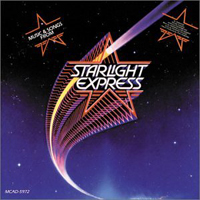 Studio Cast, 1987 (MCA)
Studio Cast, 1987 (MCA)  (2 / 5) In an introductory note for this recording, Andrew Lloyd Webber oddly describes it as a “concept album” that was made after Starlight Express had already been staged in London and New York. Even though this is not really a cast album, it’s worthy of attention because it was produced by the great Phil Ramone, and some of the singers are terrific — for example, EI DeBarge in a revised version of the title song, Richie Havens in “Light at the End of the Tunnel” and “I Am the Starlight” (a duet with Peter Hewlett). The other singers are Josie Aiello, Marc Cohn, Earl Jordan, and Harold Faltermeyer. — M.P.
(2 / 5) In an introductory note for this recording, Andrew Lloyd Webber oddly describes it as a “concept album” that was made after Starlight Express had already been staged in London and New York. Even though this is not really a cast album, it’s worthy of attention because it was produced by the great Phil Ramone, and some of the singers are terrific — for example, EI DeBarge in a revised version of the title song, Richie Havens in “Light at the End of the Tunnel” and “I Am the Starlight” (a duet with Peter Hewlett). The other singers are Josie Aiello, Marc Cohn, Earl Jordan, and Harold Faltermeyer. — M.P.
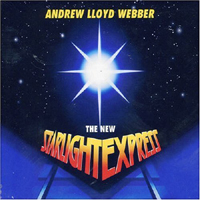 Studio Cast, 1993 (Hip-O)
Studio Cast, 1993 (Hip-O)  (3 / 5) The two-dozen tracks on this recording encompass all of the music from Starlight Express that anyone needs to hear. The songs are well performed, and there’s also some fun dialogue by “Control” (the kid who’s playing with the trains) and his mother, entertainingly delivered by Tara Wilkinson and Debbie Blankett. Greg Ellis does a fine job of singing the phenomenal title song, here arranged and orchestrated by Andrew Lloyd Webber, Nigel Wright, and David Collen. Lon Satton is Poppa, Maynard Williams is Greaseball, and Caron Cardelle is Dinah. — M.P.
(3 / 5) The two-dozen tracks on this recording encompass all of the music from Starlight Express that anyone needs to hear. The songs are well performed, and there’s also some fun dialogue by “Control” (the kid who’s playing with the trains) and his mother, entertainingly delivered by Tara Wilkinson and Debbie Blankett. Greg Ellis does a fine job of singing the phenomenal title song, here arranged and orchestrated by Andrew Lloyd Webber, Nigel Wright, and David Collen. Lon Satton is Poppa, Maynard Williams is Greaseball, and Caron Cardelle is Dinah. — M.P.
The Spitfire Grill
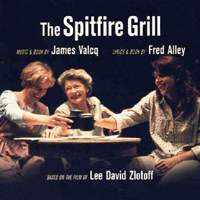 Original Off-Broadway Cast, 2001 (Triangle Road)
Original Off-Broadway Cast, 2001 (Triangle Road)  (1 / 5) About a third of the way through The Spitfire Grill, wherein a troubled young woman wanders into a sad Wisconsin hamlet and instills new hope, the sojourner and her local suitor sing the exquisite love song “This Wide Woods.” That number and one other, “Forest for the Trees,” are among the few magnets in this musical. Adapted from Lee David Zlotoff’s 1996 movie of the same title, the show is overly warm and fuzzy. Composer James Valcq and lyricist Fred Alley, who also collaborated on the book, needed to produce a more engaging score than this. For the most part, the ersatz folk tunes are quite tuneless, and too often freighted with rhymed couplets. Worse, the rhymes are not only predictable, but also scant; anytime “town” is sung, “down” nips at its footsteps, and vice versa. One driving ditty, “The Colors of Paradise,” has the characters chanting about how colorful the world has become, yet this chamber piece is almost entirely monochromatic. The cast — including Garrett Long, Phyllis Somerville, Steven Pasquale, and the always-reliable Liz Callaway — is solid, but everyone seems to be performing in shades of brown. — David Finkle
(1 / 5) About a third of the way through The Spitfire Grill, wherein a troubled young woman wanders into a sad Wisconsin hamlet and instills new hope, the sojourner and her local suitor sing the exquisite love song “This Wide Woods.” That number and one other, “Forest for the Trees,” are among the few magnets in this musical. Adapted from Lee David Zlotoff’s 1996 movie of the same title, the show is overly warm and fuzzy. Composer James Valcq and lyricist Fred Alley, who also collaborated on the book, needed to produce a more engaging score than this. For the most part, the ersatz folk tunes are quite tuneless, and too often freighted with rhymed couplets. Worse, the rhymes are not only predictable, but also scant; anytime “town” is sung, “down” nips at its footsteps, and vice versa. One driving ditty, “The Colors of Paradise,” has the characters chanting about how colorful the world has become, yet this chamber piece is almost entirely monochromatic. The cast — including Garrett Long, Phyllis Somerville, Steven Pasquale, and the always-reliable Liz Callaway — is solid, but everyone seems to be performing in shades of brown. — David Finkle
South Pacific
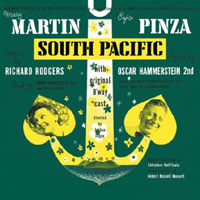 Original Broadway Cast, 1949 (Columbia/Sony)
Original Broadway Cast, 1949 (Columbia/Sony)  (5 / 5) Romantic and durable, this great Rodgers and Hammerstein score ranges from operatic to 1940s swing to quasi-Polynesian to Americana, yet each song is perfectly appropriate in terms of character and situation. Hearing the unsurpassed portrayals of the expatriate French planter Emile de Becque and U.S. navy nurse Nellie Forbush created by Ezio Pinza and Mary Martin is a sheer joy. Wonderful songs like “Some Enchanted Evening” and “A Cockeyed Optimist” were written specifically for their talents, and their interpretations of these classics remain untouched. No subsequent recording presents a more glowing performance of South Pacific. Pinza’s performance of “This Nearly Was Mine” will give you goose bumps, and the charm and heartfelt optimism of Martin’s Nellie leaps from the recording in every one of her songs, from her aforementioned introductory number to “I’m Gonna Wash That Man Right Outta My Hair” to “A Wonderful Guy” to “Honey Bun.” Juanita Hall as Bloody Mary is terrific in “Bali Ha’i” and “Happy Talk,” and as Lt. Cable, William Tabbert sings “Younger Than Springtime” and “You’ve Got to Be Carefully Taught” sweetly. Note that this album was recorded in two formats: on acetate discs, as heard on the CD edition that was released in 1998, and on magnetic tape, as heard on prior and subsequent releases. The recordings drawn from the tapes are technically superior, so be sure to acquire those through CD purchase, digital download, or whatever method you prefer. — Gerard Alessandrini
(5 / 5) Romantic and durable, this great Rodgers and Hammerstein score ranges from operatic to 1940s swing to quasi-Polynesian to Americana, yet each song is perfectly appropriate in terms of character and situation. Hearing the unsurpassed portrayals of the expatriate French planter Emile de Becque and U.S. navy nurse Nellie Forbush created by Ezio Pinza and Mary Martin is a sheer joy. Wonderful songs like “Some Enchanted Evening” and “A Cockeyed Optimist” were written specifically for their talents, and their interpretations of these classics remain untouched. No subsequent recording presents a more glowing performance of South Pacific. Pinza’s performance of “This Nearly Was Mine” will give you goose bumps, and the charm and heartfelt optimism of Martin’s Nellie leaps from the recording in every one of her songs, from her aforementioned introductory number to “I’m Gonna Wash That Man Right Outta My Hair” to “A Wonderful Guy” to “Honey Bun.” Juanita Hall as Bloody Mary is terrific in “Bali Ha’i” and “Happy Talk,” and as Lt. Cable, William Tabbert sings “Younger Than Springtime” and “You’ve Got to Be Carefully Taught” sweetly. Note that this album was recorded in two formats: on acetate discs, as heard on the CD edition that was released in 1998, and on magnetic tape, as heard on prior and subsequent releases. The recordings drawn from the tapes are technically superior, so be sure to acquire those through CD purchase, digital download, or whatever method you prefer. — Gerard Alessandrini
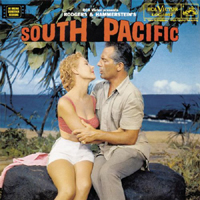 Film Soundtrack, 1958 (RCA)
Film Soundtrack, 1958 (RCA)  (5 / 5) It’s too bad that the film version of South Pacific isn’t as successful as the soundtrack album it yielded. This is a beautiful reading of the score, with excellent vocal performances by Mitzi Gaynor and Giorgio Tozzi (dubbing for Rossano Brazzi). Gaynor’s “A Wonderful Guy” is especially good, but she has many other lovely moments. Tozzi’s renditions of “Some Enchanted Evening” and “This Nearly Was Mine” differ from Pinza’s but are very beautiful in their own right; often sung pianissimo, his performances are perfect for the intimacy of film, and they come across very well on the album. Bill Lee and Muriel Smith, the vocal doubles for John Kerr and Juanita Hall, offer satisfying renditions of Lt. Cable’s and Bloody Mary’s songs. (Hall did her own fine singing as Bloody Mary on Broadway, as evidenced by the original cast album, so it’s odd that she was dubbed for the movie by Smith, who had played the role in the London production of the show.) Also heard on the album is “My Girl Back Home,” a song dropped from the stage score but reinstated for the film, along with some other music that was cut from the film itself — for example, the album contains a much fuller performance of “I’m Gonna Wash That Man Right Outta My Hair.” But the real triumphs of the movie and the soundtrack recording are the spectacular orchestrations, played by as many as 125 musicians, and Ken Darby’s splendid choral arrangements, all under the supervision of Alfred Newman. — G.A.
(5 / 5) It’s too bad that the film version of South Pacific isn’t as successful as the soundtrack album it yielded. This is a beautiful reading of the score, with excellent vocal performances by Mitzi Gaynor and Giorgio Tozzi (dubbing for Rossano Brazzi). Gaynor’s “A Wonderful Guy” is especially good, but she has many other lovely moments. Tozzi’s renditions of “Some Enchanted Evening” and “This Nearly Was Mine” differ from Pinza’s but are very beautiful in their own right; often sung pianissimo, his performances are perfect for the intimacy of film, and they come across very well on the album. Bill Lee and Muriel Smith, the vocal doubles for John Kerr and Juanita Hall, offer satisfying renditions of Lt. Cable’s and Bloody Mary’s songs. (Hall did her own fine singing as Bloody Mary on Broadway, as evidenced by the original cast album, so it’s odd that she was dubbed for the movie by Smith, who had played the role in the London production of the show.) Also heard on the album is “My Girl Back Home,” a song dropped from the stage score but reinstated for the film, along with some other music that was cut from the film itself — for example, the album contains a much fuller performance of “I’m Gonna Wash That Man Right Outta My Hair.” But the real triumphs of the movie and the soundtrack recording are the spectacular orchestrations, played by as many as 125 musicians, and Ken Darby’s splendid choral arrangements, all under the supervision of Alfred Newman. — G.A.
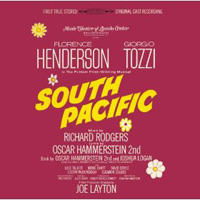 Music Theater of Lincoln Center Cast, 1967 (Columbia/Masterworks Broadway)
Music Theater of Lincoln Center Cast, 1967 (Columbia/Masterworks Broadway)  (3 / 5) Produced by Richard Rodgers himself at what was then called the New York State Theater, this South Pacific revival starred Florence Henderson, a Broadway singer in her pre-TV-sitcom days, and Giorgio Tozzi, the acclaimed operatic bass-baritone who had dubbed the singing voice of Emile for the film version about nine years earlier. Both are very impressive in their roles, and except for some flaws in the sound quality of the recording, this is a fine cast album. (It’s interesting to note that Tozzi sings “Some Enchanted Evening” in a higher key than the original as sung by Pinza. For some strange reason, that song was placed right after, rather than just before, “Bloody Mary” on the LP issues of this album, but the order has been corrected for the Masterworks Broadway CD edition. ) Irene Byatt is perfect as Bloody Mary, and Justin McDonough does a good job with Cable’s songs. As a little bonus, another future TV star, David Doyle, makes a very brief vocal appearance as Luther Billis. — G.A.
(3 / 5) Produced by Richard Rodgers himself at what was then called the New York State Theater, this South Pacific revival starred Florence Henderson, a Broadway singer in her pre-TV-sitcom days, and Giorgio Tozzi, the acclaimed operatic bass-baritone who had dubbed the singing voice of Emile for the film version about nine years earlier. Both are very impressive in their roles, and except for some flaws in the sound quality of the recording, this is a fine cast album. (It’s interesting to note that Tozzi sings “Some Enchanted Evening” in a higher key than the original as sung by Pinza. For some strange reason, that song was placed right after, rather than just before, “Bloody Mary” on the LP issues of this album, but the order has been corrected for the Masterworks Broadway CD edition. ) Irene Byatt is perfect as Bloody Mary, and Justin McDonough does a good job with Cable’s songs. As a little bonus, another future TV star, David Doyle, makes a very brief vocal appearance as Luther Billis. — G.A.
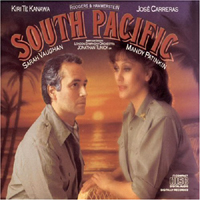 Studio Cast, 1986 (CBS/Sony) No stars; not recommended. Although it stars opera greats Kiri Te Kanawa and José Carreras, this recording is an out-and-out failure. Te Kanawa’s voice is too sophisticated and grand for the young, naive Nellie Forbush, and Carreras’ tenor is inappropriate for the older, wiser Emile de Becque. In supporting roles, Sarah Vaughan as Bloody Mary and Mandy Patinkin as Cable are also miscast. While the recording features the London Symphony Orchestra conducted by Jonathan Tunick, the score sounds lethargic here. — G.A.
Studio Cast, 1986 (CBS/Sony) No stars; not recommended. Although it stars opera greats Kiri Te Kanawa and José Carreras, this recording is an out-and-out failure. Te Kanawa’s voice is too sophisticated and grand for the young, naive Nellie Forbush, and Carreras’ tenor is inappropriate for the older, wiser Emile de Becque. In supporting roles, Sarah Vaughan as Bloody Mary and Mandy Patinkin as Cable are also miscast. While the recording features the London Symphony Orchestra conducted by Jonathan Tunick, the score sounds lethargic here. — G.A.
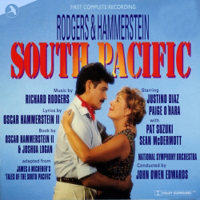 Studio Cast, 1997 (JAY, 2CDs)
Studio Cast, 1997 (JAY, 2CDs)  (2 / 5) This is a note-complete recording of the South Pacific score, but it’s not very good overall. It boasts operatic bass-baritone Justino Diaz as Emile, and Paige O’Hara, the vocal star of Disney’s wonderful animated film Beauty and the Beast, as Nellie, but their renditions of the songs lack charisma. Pat Suzuki brings spunk and mystery to Bloody Mary’s numbers, and Sean McDermott as Cable also comes across well, his beautiful tenor adding to the album’s credibility. However, John Owen Edwards’ conducting isn’t up to his usual high standards; some of his tempi are sluggish, and the performance lacks vibrancy. It’s a big plus that this is a full document of the score, including the complete overture, the entr’acte, and the scene-change music. Still, it’s more worthwhile for research than for its entertainment value. — G.A.
(2 / 5) This is a note-complete recording of the South Pacific score, but it’s not very good overall. It boasts operatic bass-baritone Justino Diaz as Emile, and Paige O’Hara, the vocal star of Disney’s wonderful animated film Beauty and the Beast, as Nellie, but their renditions of the songs lack charisma. Pat Suzuki brings spunk and mystery to Bloody Mary’s numbers, and Sean McDermott as Cable also comes across well, his beautiful tenor adding to the album’s credibility. However, John Owen Edwards’ conducting isn’t up to his usual high standards; some of his tempi are sluggish, and the performance lacks vibrancy. It’s a big plus that this is a full document of the score, including the complete overture, the entr’acte, and the scene-change music. Still, it’s more worthwhile for research than for its entertainment value. — G.A.
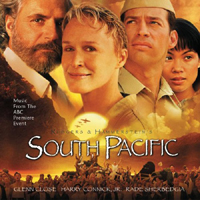 Television Film Soundtrack, 2001 (Sony)
Television Film Soundtrack, 2001 (Sony)  (2 / 5) In this soundtrack recording of the 2001 ABC-TV production of South Pacific, a mature Glenn Close is Nellie Forbush — a character who’s supposed to be no older than her late teens or early twenties. From a dramatic standpoint, Close somehow pulls it off, substituting naïveté and optimism for youth. She also sings quite adequately, having come from a Broadway musical background; her renditions of “I’m Gonna Wash That Man Right Outta My Hair” and “A Wonderful Guy” are effective. In the men’s roles, Rade Serbedzija’s voice lacks the musicality and resonance for Emile de Becque’s ballads, so his performances of these beautiful songs are very disappointing. Harry Connick, Jr. as Lt. Cable sounds like a crooner and lacks enthusiasm in his rendition of “Younger Than Springtime.” Lori Tan Chinn as Bloody Mary does fairly well singing “Bali Hai,” but “Happy Talk” is not in the TV film and not on this recording. However, included as a bonus track is “My Girl Back Home,” a charming song that was dropped from the original Broadway stage production and was recorded by Connick and Cose but not restored for this film itself. Overall, the recording leaves a lot to be desired. The best number is “There Is Nothin’ Like a Dame,” performed with spirit and energy. (Robert Pastorelli as Billis is a lot of fun.) But most of the arrangements and orchestrations are moody, overly atmospheric, and ultimately quite bland. If you are a wild fan of Glenn Close, this one’s for you, but, if you want a satisfying recording of the score of South Pacific, there’s no need to consider it as an option. — G.A.
(2 / 5) In this soundtrack recording of the 2001 ABC-TV production of South Pacific, a mature Glenn Close is Nellie Forbush — a character who’s supposed to be no older than her late teens or early twenties. From a dramatic standpoint, Close somehow pulls it off, substituting naïveté and optimism for youth. She also sings quite adequately, having come from a Broadway musical background; her renditions of “I’m Gonna Wash That Man Right Outta My Hair” and “A Wonderful Guy” are effective. In the men’s roles, Rade Serbedzija’s voice lacks the musicality and resonance for Emile de Becque’s ballads, so his performances of these beautiful songs are very disappointing. Harry Connick, Jr. as Lt. Cable sounds like a crooner and lacks enthusiasm in his rendition of “Younger Than Springtime.” Lori Tan Chinn as Bloody Mary does fairly well singing “Bali Hai,” but “Happy Talk” is not in the TV film and not on this recording. However, included as a bonus track is “My Girl Back Home,” a charming song that was dropped from the original Broadway stage production and was recorded by Connick and Cose but not restored for this film itself. Overall, the recording leaves a lot to be desired. The best number is “There Is Nothin’ Like a Dame,” performed with spirit and energy. (Robert Pastorelli as Billis is a lot of fun.) But most of the arrangements and orchestrations are moody, overly atmospheric, and ultimately quite bland. If you are a wild fan of Glenn Close, this one’s for you, but, if you want a satisfying recording of the score of South Pacific, there’s no need to consider it as an option. — G.A.
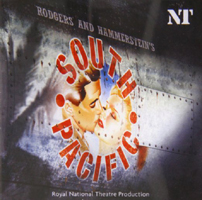 Royal National Theater Cast, 2002 (First Night)
Royal National Theater Cast, 2002 (First Night)  (2 / 5) Although the score is conducted with passion by Stephen Brooker, this cast album of Trevor Nunn’s production of South Pacific features some less-than-stellar vocal performances and some unfortunate rearrangements of the music. As Emile, Philip Quast is the most effective of the four leads; his rich baritone is melodic, despite the bleat in his vibrato at times, and he conveys the right romantic fervor in the role. But Lauren Kennedy’s Nellie has a twang and nasality that can be cloying. Although Sheila Francisco is well cast as Bloody Mary, the throatiness of her voice is distracting. Edward Baker Duly as Cable displays a tenor that’s fine, yet not distinctive. On the plus side, this recording includes “Now Is the Time,” a brisk, march-tempo song for Emile and Cable that was dropped from the score before the show’s New York premiere. There is also a good amount of dialogue and underscoring, plus some reprises not included on previous recordings. — G.A.
(2 / 5) Although the score is conducted with passion by Stephen Brooker, this cast album of Trevor Nunn’s production of South Pacific features some less-than-stellar vocal performances and some unfortunate rearrangements of the music. As Emile, Philip Quast is the most effective of the four leads; his rich baritone is melodic, despite the bleat in his vibrato at times, and he conveys the right romantic fervor in the role. But Lauren Kennedy’s Nellie has a twang and nasality that can be cloying. Although Sheila Francisco is well cast as Bloody Mary, the throatiness of her voice is distracting. Edward Baker Duly as Cable displays a tenor that’s fine, yet not distinctive. On the plus side, this recording includes “Now Is the Time,” a brisk, march-tempo song for Emile and Cable that was dropped from the score before the show’s New York premiere. There is also a good amount of dialogue and underscoring, plus some reprises not included on previous recordings. — G.A.
 Carnegie Hall Concert Cast, 2006 (Verve)
Carnegie Hall Concert Cast, 2006 (Verve)  (2 / 5) This recording is taken from a concert performance at Carnegie Hall that was also telecast on PBS. It has a tentative quality that many quickly assembled concerts tend to have, and it lacks the pace and energy of a cast album of a full stage production. It also features, for better or worse, the kind of famous names that can draw a crowd for a concert in a major hall and a TV broadcast. In this case, Reba McEntire and Brian Stokes Mitchell are fairly well suited to the roles of Nellie and Emile, while Alec Baldwin as Luther Billis falls more into the category of stunt casting than perfect casting. McEntire gives a colorful and spirited performance, but her country singer’s twang is far too exaggerated to permit a proper interpretation of Ensign Nellie Forbush. While Mitchell sings magnificently, his contemporary stylistic choices seem anachronistic to the score; his renditions of the classic songs “Some Enchanted Evening” and “This Nearly Was Mine” are better characterized as “good covers” than effective dramatic performances. Jason Danieley is well cast as Lt. Cable, but Lillias White as Bloody Mary also gives more of a star turn than a valid interpretation of this character role. Further working against the appeal of this recording, the large chunks of dialogue from the show’s book seem under-rehearsed to the point of annoyance, while the Orchestra of St. Luke’s also sounds a bit unrehearsed and sometimes lacking in energy as conducted by Paul Gemignani. Overall, the album is interesting and occasionally fun, but it’s not a good representation of this magnificent musical as a piece of theater. — G.A.
(2 / 5) This recording is taken from a concert performance at Carnegie Hall that was also telecast on PBS. It has a tentative quality that many quickly assembled concerts tend to have, and it lacks the pace and energy of a cast album of a full stage production. It also features, for better or worse, the kind of famous names that can draw a crowd for a concert in a major hall and a TV broadcast. In this case, Reba McEntire and Brian Stokes Mitchell are fairly well suited to the roles of Nellie and Emile, while Alec Baldwin as Luther Billis falls more into the category of stunt casting than perfect casting. McEntire gives a colorful and spirited performance, but her country singer’s twang is far too exaggerated to permit a proper interpretation of Ensign Nellie Forbush. While Mitchell sings magnificently, his contemporary stylistic choices seem anachronistic to the score; his renditions of the classic songs “Some Enchanted Evening” and “This Nearly Was Mine” are better characterized as “good covers” than effective dramatic performances. Jason Danieley is well cast as Lt. Cable, but Lillias White as Bloody Mary also gives more of a star turn than a valid interpretation of this character role. Further working against the appeal of this recording, the large chunks of dialogue from the show’s book seem under-rehearsed to the point of annoyance, while the Orchestra of St. Luke’s also sounds a bit unrehearsed and sometimes lacking in energy as conducted by Paul Gemignani. Overall, the album is interesting and occasionally fun, but it’s not a good representation of this magnificent musical as a piece of theater. — G.A.
 Broadway Cast, 2008 (Masterworks Broadway)
Broadway Cast, 2008 (Masterworks Broadway)  (4 / 5) Here is an excellent recording of the classic Rodgers & Hammerstein score. In many ways, it’s the best audio-only representation of South Pacific as a dramatic piece. The completeness of the recording and its superb sound quality give a vivid aural picture of the wonderful Lincoln Center Theater revival, with what may be the best cast since the original production in 1949. The performances of Kelli O’Hara as Nellie and Paulo Szot (2008 Tony Award winner for Best Actor in a Musical) as Emile are very honest and never give in to show-biz campiness, as is sometimes found in recordings of older scores; the two stars take the material seriously and give us three-dimensional characters as written by Rodgers & Hammerstein and Joshua Logan, co-author of the show’s book. Danny Burstein as Billis and Loretta Ables Sayre as Bloody Mary are just as well cast, while Mathew Morrison as Lt. Cable adds youth, sex appeal, and vigor to the recording. The show’s original orchestrations are beautifully captured here in digital stereo, and have never sounded better. The album also contains some interesting hidden bonus items, such as the orchestral portions of “A Wonderful Guy” and “Some Enchanted Evening” minus the vocal tracks, so you can sing ’em yourself like Karaoke! This production’s great success proved that classic musicals needn’t be re-written, re-orchestrated, or cast with pop stars to achieve favor with modern audiences, and the cast album is a must for anyone wanting a first-rate, 21st-century recording of a timeless show. — G.A.
(4 / 5) Here is an excellent recording of the classic Rodgers & Hammerstein score. In many ways, it’s the best audio-only representation of South Pacific as a dramatic piece. The completeness of the recording and its superb sound quality give a vivid aural picture of the wonderful Lincoln Center Theater revival, with what may be the best cast since the original production in 1949. The performances of Kelli O’Hara as Nellie and Paulo Szot (2008 Tony Award winner for Best Actor in a Musical) as Emile are very honest and never give in to show-biz campiness, as is sometimes found in recordings of older scores; the two stars take the material seriously and give us three-dimensional characters as written by Rodgers & Hammerstein and Joshua Logan, co-author of the show’s book. Danny Burstein as Billis and Loretta Ables Sayre as Bloody Mary are just as well cast, while Mathew Morrison as Lt. Cable adds youth, sex appeal, and vigor to the recording. The show’s original orchestrations are beautifully captured here in digital stereo, and have never sounded better. The album also contains some interesting hidden bonus items, such as the orchestral portions of “A Wonderful Guy” and “Some Enchanted Evening” minus the vocal tracks, so you can sing ’em yourself like Karaoke! This production’s great success proved that classic musicals needn’t be re-written, re-orchestrated, or cast with pop stars to achieve favor with modern audiences, and the cast album is a must for anyone wanting a first-rate, 21st-century recording of a timeless show. — G.A.
The Sound of Music
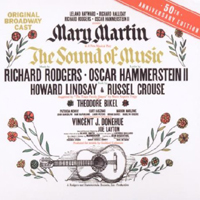 Original Broadway Cast, 1959 (Columbia/Sony)
Original Broadway Cast, 1959 (Columbia/Sony)  (5 / 5) Although excellent, this recording of the Rodgers and Hammerstein classic has been so overshadowed by the spectacularly popular film soundtrack album that it’s difficult to judge it on its own merits. Mary Martin is in good voice as Maria and seems perfectly matched to the material, yet her interpretation of the character differs greatly from that offered by Julie Andrews; Martin is more wistful, delivering the title song with a deeper, plaintive quality. As conducted by Frederick Dvonch, the score in general has a more legit tone here than it does on the soundtrack recording, and Patricia Neway brings full operatic beauty and power to the role of the Mother Abbess. Theodore Bikel is a strong presence as Captain Von Trapp. Kurt Kasznar and Marion Marlowe as Max Detweiler and Elsa Schraeder are also standouts; they perform “How Can Love Survive?” and “No Way to Stop It” delightfully. The children, including Lauri Peters as Liesl, exude warmth. From a technical and musical standpoint, this Sound of Music album is highly commendable, and as a record of the final Rodgers and Hammerstein score, it’s a must for serious collectors of transcendent musical theater. — Gerard Alessandrini
(5 / 5) Although excellent, this recording of the Rodgers and Hammerstein classic has been so overshadowed by the spectacularly popular film soundtrack album that it’s difficult to judge it on its own merits. Mary Martin is in good voice as Maria and seems perfectly matched to the material, yet her interpretation of the character differs greatly from that offered by Julie Andrews; Martin is more wistful, delivering the title song with a deeper, plaintive quality. As conducted by Frederick Dvonch, the score in general has a more legit tone here than it does on the soundtrack recording, and Patricia Neway brings full operatic beauty and power to the role of the Mother Abbess. Theodore Bikel is a strong presence as Captain Von Trapp. Kurt Kasznar and Marion Marlowe as Max Detweiler and Elsa Schraeder are also standouts; they perform “How Can Love Survive?” and “No Way to Stop It” delightfully. The children, including Lauri Peters as Liesl, exude warmth. From a technical and musical standpoint, this Sound of Music album is highly commendable, and as a record of the final Rodgers and Hammerstein score, it’s a must for serious collectors of transcendent musical theater. — Gerard Alessandrini
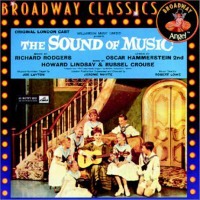 Original London Cast, 1961 (HMV/Angel)
Original London Cast, 1961 (HMV/Angel)  (4 / 5) The first London production of The Sound Of Music opened in May of 1961, a year and a half after the show premiered on Broadway. By that time, Oscar Hammerstein had died, and the show had attained a growing respect from critics, some of whom were skeptical when it first opened in New York in 1959. Also, the title of the show had gained international fame, so major stars weren’t needed to launch this West End production. On the recording, we hear Jean Bayless as Maria, Constance Shacklock as the Mother Abbess, and Roger Dann as Captain Von Trapp. Eunice Gayson and Harold Kasket are Elsa and Max, and their performances are very appealing and appropriate. Although none of this quintet are thought of as major stars, they all make lovely sounding music — and the emphasis here is on the music. By 1961, practically the whole world had come to agree on the excellence of Richard Rodgers’ score for this show, and here it’s treated with the utmost respect and care. Compared to the 1959 original and the later 1965 motion picture soundtrack, the album has more of a classical sound to it, with some slower tempos. Bayless has a lovely, strong, legit soprano voice, and her interpretation of Maria is warm and compelling. Shacklock also has a fine operatic instrument; her performance of “Climb Every Mountain” is quite grand, even a bit Wagnerian. Overall, this recording of The Sound Of Music isn’t at the top of the list, but it’s very enjoyable in its own right. — G.A.
(4 / 5) The first London production of The Sound Of Music opened in May of 1961, a year and a half after the show premiered on Broadway. By that time, Oscar Hammerstein had died, and the show had attained a growing respect from critics, some of whom were skeptical when it first opened in New York in 1959. Also, the title of the show had gained international fame, so major stars weren’t needed to launch this West End production. On the recording, we hear Jean Bayless as Maria, Constance Shacklock as the Mother Abbess, and Roger Dann as Captain Von Trapp. Eunice Gayson and Harold Kasket are Elsa and Max, and their performances are very appealing and appropriate. Although none of this quintet are thought of as major stars, they all make lovely sounding music — and the emphasis here is on the music. By 1961, practically the whole world had come to agree on the excellence of Richard Rodgers’ score for this show, and here it’s treated with the utmost respect and care. Compared to the 1959 original and the later 1965 motion picture soundtrack, the album has more of a classical sound to it, with some slower tempos. Bayless has a lovely, strong, legit soprano voice, and her interpretation of Maria is warm and compelling. Shacklock also has a fine operatic instrument; her performance of “Climb Every Mountain” is quite grand, even a bit Wagnerian. Overall, this recording of The Sound Of Music isn’t at the top of the list, but it’s very enjoyable in its own right. — G.A.
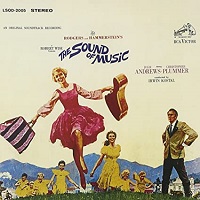 Film Soundtrack, 1965 (RCA)
Film Soundtrack, 1965 (RCA)  (5 / 5) One of the principal reasons for the enduring appeal of the hugely successful Sound of Music film and soundtrack album is the fresh approach given to the material. Julie Andrews brings wit, spirit, and buoyancy to the role of Maria. Perfectly sung and brilliantly acted, Andrews’ great performance is also notable for her clear but unaffected diction, and she knows exactly which lines to sing, which ones to exclaim. The songs of the Captain and the Mother Abbess are very well sung by Bill Lee and Margery McKay, respectively, dubbing for Christopher Plummer and Peggy Wood. McKay’s rendition of “Climb Every Mountain” is notably stirring. Charmian Carr does her own singing as Liesl; she’s charming in “Sixteen Going on Seventeen” with Dan Truhitte as Rolf, and in all of her tracks with the children. Since the two songs allotted to Elsa and Max in the show score, “How Can Love Survive?” and “No Way to Stop It,” are not included in the film, neither Eleanor Parker nor Richard Haydn (nor any vocal doubles for them who might have been employed) are heard on the soundtrack album. The arrangements and orchestrations of the film’s music overall are bright, uplifting, and thoroughly delightful from beginning to end. — G.A.
(5 / 5) One of the principal reasons for the enduring appeal of the hugely successful Sound of Music film and soundtrack album is the fresh approach given to the material. Julie Andrews brings wit, spirit, and buoyancy to the role of Maria. Perfectly sung and brilliantly acted, Andrews’ great performance is also notable for her clear but unaffected diction, and she knows exactly which lines to sing, which ones to exclaim. The songs of the Captain and the Mother Abbess are very well sung by Bill Lee and Margery McKay, respectively, dubbing for Christopher Plummer and Peggy Wood. McKay’s rendition of “Climb Every Mountain” is notably stirring. Charmian Carr does her own singing as Liesl; she’s charming in “Sixteen Going on Seventeen” with Dan Truhitte as Rolf, and in all of her tracks with the children. Since the two songs allotted to Elsa and Max in the show score, “How Can Love Survive?” and “No Way to Stop It,” are not included in the film, neither Eleanor Parker nor Richard Haydn (nor any vocal doubles for them who might have been employed) are heard on the soundtrack album. The arrangements and orchestrations of the film’s music overall are bright, uplifting, and thoroughly delightful from beginning to end. — G.A.
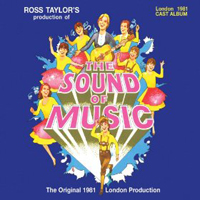 London Cast, 1981 (Epic/no CD)
London Cast, 1981 (Epic/no CD)  (4 / 5) Here’s a vibrant performance of The Sound of Music. In fact, this is the only stage cast album of the score that seems to catch the joyous excitement of the forever popular movie, due in part to rich new orchestrations and the exceptionally clear sound quality of the recording. Petula Clark comes off very well as Maria and is firmly supported by her fellow cast members, all of whom excel in their roles: Michael Jayston as Captain Von Trapp, Honor Blackman as Elsa, and June Bronhill as the Mother Abbess. “My Favorite Things,” “Sixteen Going on Seventeen,” and many of the show’s other songs were moved around for this production, but it’s all done tastefully and effectively. — G.A.
(4 / 5) Here’s a vibrant performance of The Sound of Music. In fact, this is the only stage cast album of the score that seems to catch the joyous excitement of the forever popular movie, due in part to rich new orchestrations and the exceptionally clear sound quality of the recording. Petula Clark comes off very well as Maria and is firmly supported by her fellow cast members, all of whom excel in their roles: Michael Jayston as Captain Von Trapp, Honor Blackman as Elsa, and June Bronhill as the Mother Abbess. “My Favorite Things,” “Sixteen Going on Seventeen,” and many of the show’s other songs were moved around for this production, but it’s all done tastefully and effectively. — G.A.
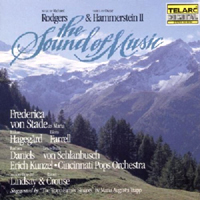 Studio Cast, 1987 (Telstar)
Studio Cast, 1987 (Telstar)  (2 / 5) This recording features a large orchestra and several classically trained singers, so it has a grand-opera feel about it, yet it lacks the theatrical energy often heard on stage cast albums. Frederica von Stade sings Maria’s songs with rich, round tone. While she may not be fully convincing in this role from a dramatic standpoint, her lovely voice mostly lends itself well to the beautiful Rodgers and Hammerstein score. But the nuns, some of the children, and Rolf (Neil Jones) sound a little stiff, and the charm of the character roles of Max and Elsa are obliterated by the hugely operatic performances of Lewis Dahle von Schlanbusch and Barbara Daniels; their rendition of the comic gem “How Can Love Survive?” is way off the mark. As Captain Von Trapp, Håkan Hagegård sounds more appropriate, but not very exciting. The vocal highlight of the recording is Eileen Farrell’s exquisite rendition of “Climb Every Mountain.” Erich Kunzel conducts the Cincinnati Pops Orchestra with no particular zest. In sum, the recording is of interest primarily to those who are curious to hear what this musical might sound like if it entered the repertoire of the Metropolitan Opera. — G.A.
(2 / 5) This recording features a large orchestra and several classically trained singers, so it has a grand-opera feel about it, yet it lacks the theatrical energy often heard on stage cast albums. Frederica von Stade sings Maria’s songs with rich, round tone. While she may not be fully convincing in this role from a dramatic standpoint, her lovely voice mostly lends itself well to the beautiful Rodgers and Hammerstein score. But the nuns, some of the children, and Rolf (Neil Jones) sound a little stiff, and the charm of the character roles of Max and Elsa are obliterated by the hugely operatic performances of Lewis Dahle von Schlanbusch and Barbara Daniels; their rendition of the comic gem “How Can Love Survive?” is way off the mark. As Captain Von Trapp, Håkan Hagegård sounds more appropriate, but not very exciting. The vocal highlight of the recording is Eileen Farrell’s exquisite rendition of “Climb Every Mountain.” Erich Kunzel conducts the Cincinnati Pops Orchestra with no particular zest. In sum, the recording is of interest primarily to those who are curious to hear what this musical might sound like if it entered the repertoire of the Metropolitan Opera. — G.A.
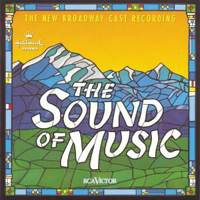 Broadway Cast, 1998 (RCA)
Broadway Cast, 1998 (RCA)  (2 / 5) Although this cast album of the first (and, to date, the only) Broadway revival of The Sound of Music is pleasant, with competent work by Rebecca Luker as Maria and Michael Siberry as the Captain, there’s nothing outstanding about it. Luker has a lovely soprano, but she lacks a distinctive personality in the role. Patti Cohenour seems vocally miscast as the Mother Abbess; her beautiful but very youthful-sounding voice is disconcerting in “Climb Every Mountain.” The performances of the other cast members are tepid, and the orchestrations are weak. — G.A.
(2 / 5) Although this cast album of the first (and, to date, the only) Broadway revival of The Sound of Music is pleasant, with competent work by Rebecca Luker as Maria and Michael Siberry as the Captain, there’s nothing outstanding about it. Luker has a lovely soprano, but she lacks a distinctive personality in the role. Patti Cohenour seems vocally miscast as the Mother Abbess; her beautiful but very youthful-sounding voice is disconcerting in “Climb Every Mountain.” The performances of the other cast members are tepid, and the orchestrations are weak. — G.A.
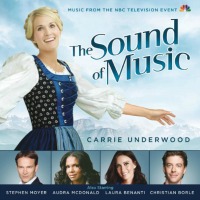 Television Cast, 2014 (Sony Masterworks )
Television Cast, 2014 (Sony Masterworks )  (3 / 5) This is a fresh and largely wonderful new recording of a classic score. Carrie Underwood leads the cast as a Maria Von Trapp for the new century. Although her acting skills in the live television presentation left much to be desired, her musical performance is very sweet on its own Country/Western terms. Audra McDonald sings beautifully as the Mother Abbess, even if she doesn’t posses the type of mezzo/contralto voice usually associated with the role. As Elsa and Max, Laura Benanti and Christian Borle are both excellent. Stephen Moyer is no more than adequate as Captain Von Trapp, but all the children and the nuns’ chorus are nearly as good as those heard on the finest of the other recordings. Overall, this performance breathes new life into songs that have become almost too familiar because they are so beloved. It’s a testament to Rodgers and Hammerstein that the score of The Sound of Music can be interpreted in so many different ways, even sometimes by actors who are miscast, and still come shining through. — G.A.
(3 / 5) This is a fresh and largely wonderful new recording of a classic score. Carrie Underwood leads the cast as a Maria Von Trapp for the new century. Although her acting skills in the live television presentation left much to be desired, her musical performance is very sweet on its own Country/Western terms. Audra McDonald sings beautifully as the Mother Abbess, even if she doesn’t posses the type of mezzo/contralto voice usually associated with the role. As Elsa and Max, Laura Benanti and Christian Borle are both excellent. Stephen Moyer is no more than adequate as Captain Von Trapp, but all the children and the nuns’ chorus are nearly as good as those heard on the finest of the other recordings. Overall, this performance breathes new life into songs that have become almost too familiar because they are so beloved. It’s a testament to Rodgers and Hammerstein that the score of The Sound of Music can be interpreted in so many different ways, even sometimes by actors who are miscast, and still come shining through. — G.A.
Sophisticated Ladies
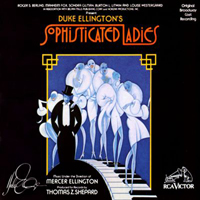 Original Broadway Cast, 1981 (RCA)
Original Broadway Cast, 1981 (RCA)  (3 / 5) Duke Ellington classics were well served in the revue Sophisticated Ladies, which received 10 Tony Award nominations and ran on Broadway for nearly two years. Without the show’s visual elements, the recording sounds more like a greatest-hits anthology featuring the Duke Ellington Orchestra and fine singers than a traditional cast album, but Ellington’s genius as a composer is amply evident in the staggering array of wonderful songs to be found here: “It Don’t Mean a Thing,” “Don’t Get Around Much Anymore,” “Take the A Train,” “I Let a Song Go Out of My Heart,” “Satin Doll,” “Mood Indigo,” “I Got It Bad and That Ain’t Good,” “I’m Beginning to See the Light” — and, of course, “Sophisticated Lady.” Cast members Gregory Hines, Judith Jamison, Phyllis Hyman, P.J. Benjamin, Gregg Burge, and Hinton Battle are all top-notch, as is the musical direction by Mercer Ellington. — Morgan Sills
(3 / 5) Duke Ellington classics were well served in the revue Sophisticated Ladies, which received 10 Tony Award nominations and ran on Broadway for nearly two years. Without the show’s visual elements, the recording sounds more like a greatest-hits anthology featuring the Duke Ellington Orchestra and fine singers than a traditional cast album, but Ellington’s genius as a composer is amply evident in the staggering array of wonderful songs to be found here: “It Don’t Mean a Thing,” “Don’t Get Around Much Anymore,” “Take the A Train,” “I Let a Song Go Out of My Heart,” “Satin Doll,” “Mood Indigo,” “I Got It Bad and That Ain’t Good,” “I’m Beginning to See the Light” — and, of course, “Sophisticated Lady.” Cast members Gregory Hines, Judith Jamison, Phyllis Hyman, P.J. Benjamin, Gregg Burge, and Hinton Battle are all top-notch, as is the musical direction by Mercer Ellington. — Morgan Sills
Songs for a New World
 Original Cast, 1997 (RCA)
Original Cast, 1997 (RCA)  (3 / 5) Songs for a New World documents composer-lyricist Jason Robert Brown’s superb musicianship and his knack for connecting with younger audiences who appreciate contemporary musical theater styles. Even though Brown’s occasional tendency toward self-indulgence in his work is apparent here, this recording of his inaugural revue makes it clear why he burst onto the New York theater scene in such a big way. As a creator of story songs, he’s a master, and some of his most brilliant work is heard on this album. Highlights include “Stars and the Moon” and the searingly funny Brecht/Weill parody “Surabaya Santa,” both expertly sung by Jessica Molaskey; ”I’m Not Afraid of Anything,” movingly delivered by Andrea Burns; and the modern love duet “I’d Give It All for You,” impressively performed by Burns and Brooks Ashmanskas. Ty Taylor, the fourth performer heard here, is somewhat lacking in spark. The singers, the band (led by Brown), and the orchestrations (by Brown and Doug Besterman) generally keep the songs sharp, but some of them have a similar, inflated sound that grows wearisome in large doses — notably, “The New World,” ”American Flag, 1775,” and “Hear My Song” (in which Brown sings). So, worthy as this recording is, it’s most enjoyable when sampled a little at a time. — Matthew Murray
(3 / 5) Songs for a New World documents composer-lyricist Jason Robert Brown’s superb musicianship and his knack for connecting with younger audiences who appreciate contemporary musical theater styles. Even though Brown’s occasional tendency toward self-indulgence in his work is apparent here, this recording of his inaugural revue makes it clear why he burst onto the New York theater scene in such a big way. As a creator of story songs, he’s a master, and some of his most brilliant work is heard on this album. Highlights include “Stars and the Moon” and the searingly funny Brecht/Weill parody “Surabaya Santa,” both expertly sung by Jessica Molaskey; ”I’m Not Afraid of Anything,” movingly delivered by Andrea Burns; and the modern love duet “I’d Give It All for You,” impressively performed by Burns and Brooks Ashmanskas. Ty Taylor, the fourth performer heard here, is somewhat lacking in spark. The singers, the band (led by Brown), and the orchestrations (by Brown and Doug Besterman) generally keep the songs sharp, but some of them have a similar, inflated sound that grows wearisome in large doses — notably, “The New World,” ”American Flag, 1775,” and “Hear My Song” (in which Brown sings). So, worthy as this recording is, it’s most enjoyable when sampled a little at a time. — Matthew Murray
Song of Singapore
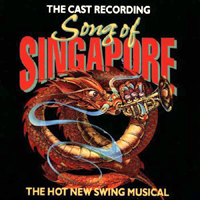 Original Off-Broadway Cast Members, 1992 (DRG)
Original Off-Broadway Cast Members, 1992 (DRG)  (2 / 5) A tongue-in-cheek pastiche of 1940s pop culture, Song of Singapore had a substantial Off-Broadway run at a nightclub venue. It was whipped up by a quartet of composer-performers: Erik Frandsen, Michael Garin, Robert Hipkens, and Paula Lockheart, who wrote the songs and collaborated on the book with Allan Katz. Set in a Singapore gin mill, the plot deals with a jewel heist, a murder, an amnesiac female flier who’s also a lounge singer, and a band called the Malayan Melody Makers. It includes elements of works by W. Somerset Maugham, Raymond Chandler, and numerous black-and-white movies. The songs work nicely within the context of the daffy libretto and benefit from first-rate execution by a five-person combo; further instrumentation is provided by the versatile cast. With tropical drinks flowing and table-seated spectators surrounded by dramatic action, Song of Singapore was a great night out, but no one’s idea of a landmark in musical theater. Still, the swinging score received Drama Desk and Outer Critics Circle citations and was preserved via this recording, which features the torchy Jacquey Maltby and three of the show’s songwriters. (The fourth, Lockheart, served as the production’s “jazzaturg.”) Donna Murphy, who was in the original cast, is not heard here. Director A. J. Antoon died during the show’s run, so Song of Singapore is fondly remembered by theater folk as his swan song. — Charles Wright
(2 / 5) A tongue-in-cheek pastiche of 1940s pop culture, Song of Singapore had a substantial Off-Broadway run at a nightclub venue. It was whipped up by a quartet of composer-performers: Erik Frandsen, Michael Garin, Robert Hipkens, and Paula Lockheart, who wrote the songs and collaborated on the book with Allan Katz. Set in a Singapore gin mill, the plot deals with a jewel heist, a murder, an amnesiac female flier who’s also a lounge singer, and a band called the Malayan Melody Makers. It includes elements of works by W. Somerset Maugham, Raymond Chandler, and numerous black-and-white movies. The songs work nicely within the context of the daffy libretto and benefit from first-rate execution by a five-person combo; further instrumentation is provided by the versatile cast. With tropical drinks flowing and table-seated spectators surrounded by dramatic action, Song of Singapore was a great night out, but no one’s idea of a landmark in musical theater. Still, the swinging score received Drama Desk and Outer Critics Circle citations and was preserved via this recording, which features the torchy Jacquey Maltby and three of the show’s songwriters. (The fourth, Lockheart, served as the production’s “jazzaturg.”) Donna Murphy, who was in the original cast, is not heard here. Director A. J. Antoon died during the show’s run, so Song of Singapore is fondly remembered by theater folk as his swan song. — Charles Wright

